-
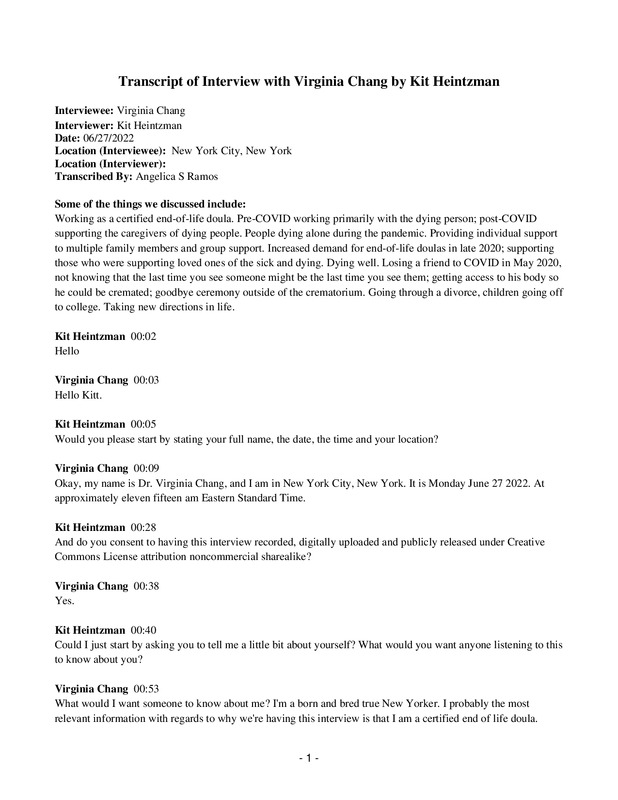
2022-06-27
Self Description: " I'm a born and bred true New Yorker. I probably the most relevant information with regards to why we're having this interview is that I am a certified end of life doula. That's probably how I identify myself recently, although it's only a profession and a role that I've come into more recently in life. But it's become a major part of my life and my identity right now and the work that I do and the way it has impacted me in the last few years. So but, um, but it's not the sum total of who I am. But we'll just leave it at that."
-
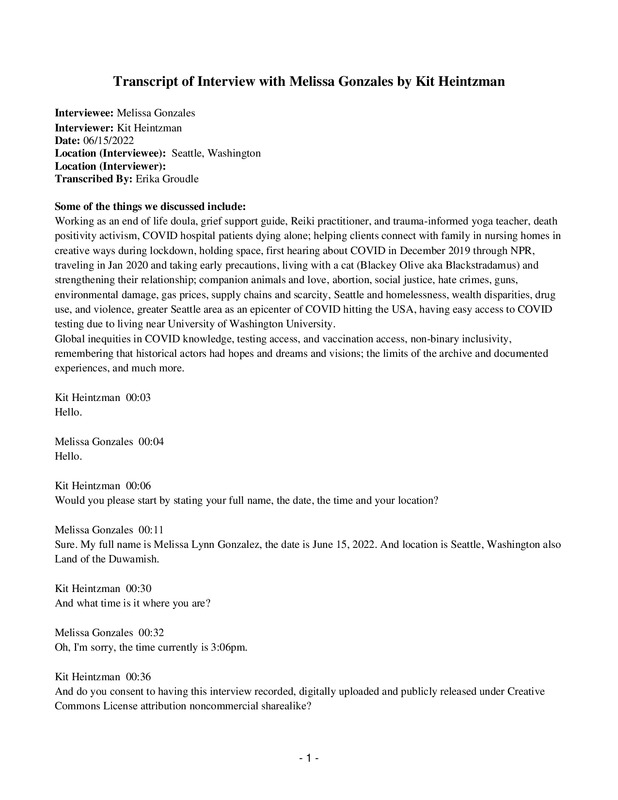
2022-06-15
Self Description: "My name is Melissa Lynn Gonzalez, and I am an end of life doula, a grief support guide, and a trauma informed yoga teacher and Reiki practitioner."
-
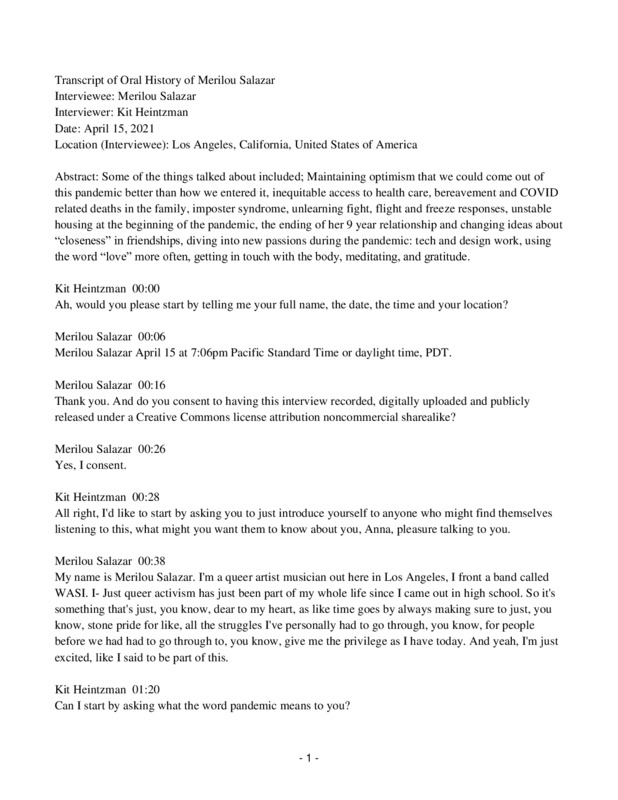
2021-04-15
Self-Description: “My name is Merilou Salazar. I’m a queer artist, musician out here in Los Angeles. I front a band called WASI. Queer activism has just been a part of my whole life since I came out in high school, so it’s something that’s dear to my heart. As time goes by, always making sure to stand proud for all the struggles that I have personally had to go through, all the people before me had to go through to give me the privileges I have today.”
Some of the things we talked about included:
Maintaining optimism that we could come out of this pandemic better than how we entered it
Inequitable access to health care
Bereavement and COVID related deaths in the family
Imposter syndrome
Unlearning fight, flight, and freeze responses
Unstable housing at the beginning of the pandemic
The ending of her 9 year relationship and changing ideas about “closeness” in friendships
Diving into new passions during the pandemic: tech and design work
Re-evaluating collaboration
Spiritual surrendering and accountability toward one’s self
Using the word “love” more often, getting in touch with the body, meditating, and gratitude
Other cultural references: Postmating, Zoom
See also:
https://wasi.bandcamp.com
-
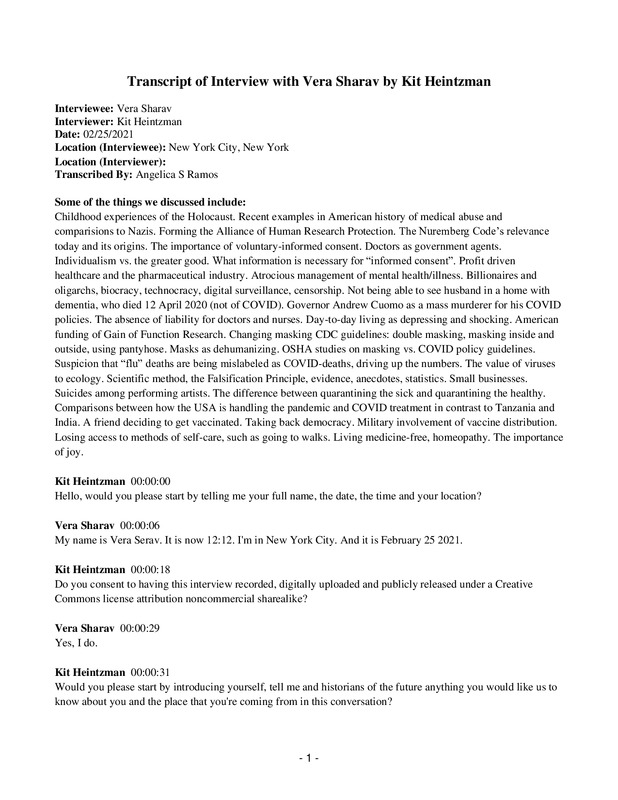
2021-02-25T12:12
Self-description:
“I’m a child survivor of the Holocaust, so my perspective brings into the current situation a very relevant background. I find this very very difficult to acknowledge, because I never thought that I would have to speak about that in the here and now. I’ve been involved as a public advocate for ethical research in medicine. It began when my son, my older son, got sick. He got mentally ill. He had schizophrenia. So, I had to do a lot of learning about the field, what could be done to help him. I both learned, and I had to bury my son. Okay. He was put on a medication that was promised to be the end-all and be-all. It was just going to be great. It killed him. Okay. Before that, during his sickness because I had to start learning how to maneuver the mental health system, which is about as bad as it can be.”
Some of the things we discussed included:
Childhood experiences of the Holocaust.
Recent examples in American history of medical abuse and comparisions to Nazis.
Forming the Alliance of Human Research Protection.
The Nuremberg Code’s relevance today and its origins.
The importance of voluntary-informed consent.
Doctors as government agents.
Individualism vs. the greater good.
What information is necessary for “informed consent”.
Profit driven healthcare and the pharmaceutical industry.
Atrocious management of mental health/illness.
Billionaires and oligarchs, biocracy, technocracy, digital surveillance, censorship.
Not being able to see husband in a home with dementia, who died 12 April 2020 (not of COVID).
Governor Andrew Cuomo as a mass murderer for his COVID policies.
The absence of liability for doctors and nurses.
Day-to-day living as depressing and shocking.
American funding of Gain of Function Research.
Changing masking CDC guidelines: double masking, masking inside and outside, using pantyhose.
Masks as dehumanizing.
OSHA studies on masking vs. COVID policy guidelines.
Suspicion that “flu” deaths are being mislabeled as COVID-deaths, driving up the numbers.
The value of viruses to ecology.
Scientific method, the Falsification Principle, evidence, anecdotes, statistics
Small businesses
Suicides among performing artists
The difference between quarantining the sick and quarantining the healthy.
Comparisons between how the USA is handling the pandemic and COVID treatment in contrast to Tanzania and India.
A friend deciding to get vaccinated.
Taking back democracy.
Military involvement of vaccine distribution.
Losing access to methods of self-care, such as going to walks.
Living medicine-free, homeopathy.
The importance of joy.
Other cultural references include:
a 1987 article in the American Journal of Psychiatry, “L-dopa Challenge and Relapse in Schizophrenia” (https://doi.org/10.1176/ajp.144.7.934), Bayh-Dole Act, Aktion T4, Amazon, Milgram Experiment, 1918 influenza, BSE, Ezekiel Emanuel, ObamaCare, Pandemrix, iPhone, JAMA, The New England Journal of Medicine, The Lancet, George Orwell’s Nineteen-Eighty-Four (1949)
-
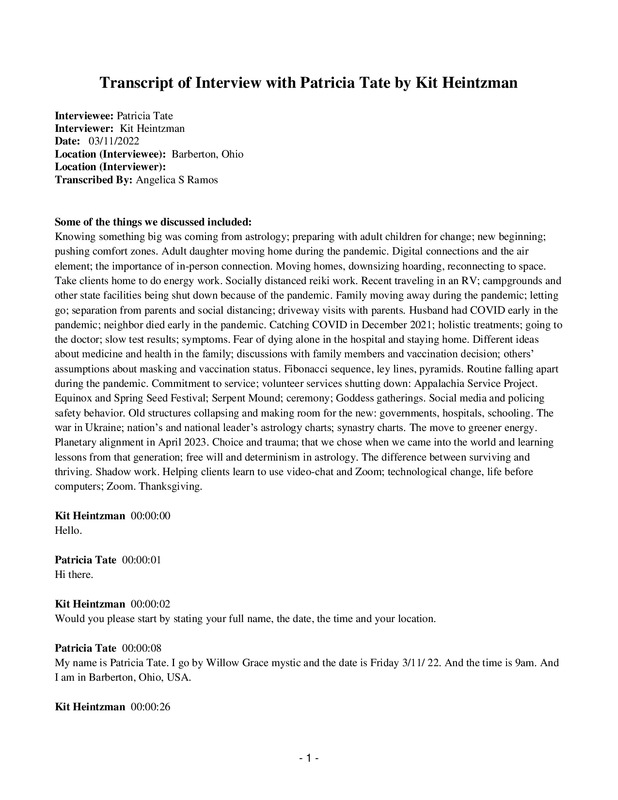
2022-03-11
Self description: “My name is Patricia Tate. I consider myself a healer. I use astrology, tarot, I’m a Reiki Master, and I use Aka Dua, and so I’m an energy worker. And the goal is to help work with others through whatever they… or to guide them or to give them information. I receive dreams. And yeah, I don’t know what else you’d want to know about that.”
Some of the things we discussed included:
Knowing something big was coming from astrology; preparing with adult children for change; new beginning; pushing comfort zones.
Adult daughter moving home during the pandemic.
Digital connections and the air element; the importance of in-person connection.
Moving homes, downsizing hoarding, reconnecting to space.
Take clients home to do energy work.
Socially distanced reiki work.
Recent traveling in an RV; campgrounds and other state facilities being shut down because of the pandemic.
Family moving away during the pandemic; letting go; separation from parents and social distancing; driveway visits with parents.
Husband had COVID early in the pandemic; neighbor died early in the pandemic.
Catching COVID in December 2021; holistic treatments; going to the doctor; slow test results; symptoms.
Fear of dying alone in the hospital and staying home.
Different ideas about medicine and health in the family; discussions with family members and vaccination decision; others’ assumptions about masking and vaccination status.
Fibonacci sequence, ley lines, pyramids.
Routine falling apart during the pandemic.
Commitment to service; volunteer services shutting down: Appalachia Service Project
Equinox and Spring Seed Festival; Serpent Mound; ceremony; Goddess gatherings
Social media and policing safety behavior.
Old structures collapsing and making room for the new: governments, hospitals, schooling.
The war in Ukraine; nation’s and national leader’s astrology charts; synastry charts.
The move to greener energy.
Planetary alignment in April 2023.
Choice and trauma; that we chose when we came into the world and learning lessons from that generation; free will and determinism in astrology.
The difference between surviving and thriving.
Shadow work.
Helping clients learn to use video-chat and Zoom; technological change, life before computers; Zoom Thanksgiving.
Some other cultural references included: Zoom, GoogleMeet, YouTube
-
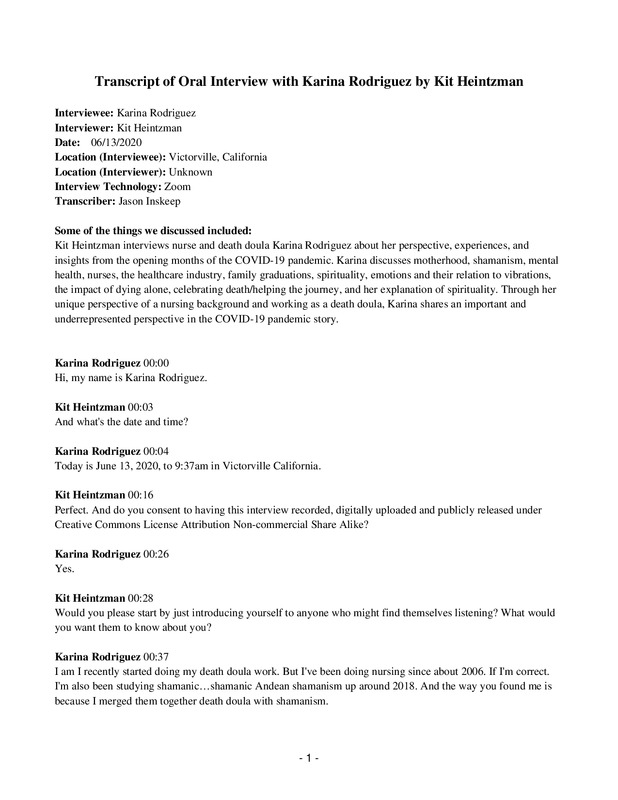
2020-06-13
Self Description: "I recently started doing my death doula work. But I've been doing nursing since about 2006. If I'm correct. I'm also been studying shamanic…shamanic Andean shamanism up around 2018. And the way you found me is because I merged them together death doula with shamanism."
-
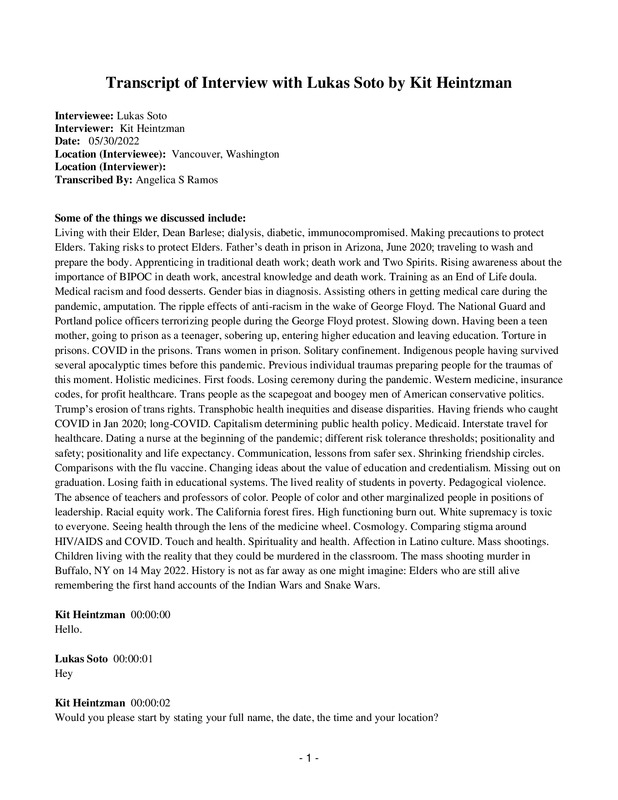
2022-05-30
Self Description: "my name is Lukas Soto. I use they them pronouns in English and elle en Espanol, I'm a mixed race Chile Mapuche, and then Minnesota Chippewa or Ojibwe and Western European. I grew up in the Pacific Northwest, and lived in Oregon for the better part of 30 years. And I currently reside on the Pyramid Lake Paiute reservation in northwestern Nevada, where I live with my elder Dean bar lease, who had been kind of apprenticing or mentoring under when it comes to traditional death work."
-
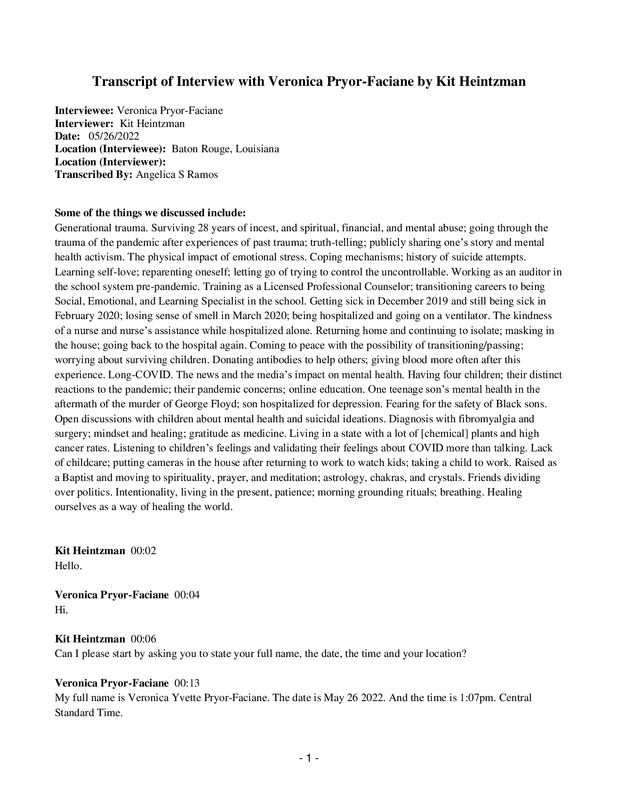
2022-05-26
Self Description: "Well, my name is Veronica. And I am the mother of four. And I'm married. I went through a lot of trauma growing up. So to be introduced, another traumatic experience shows the resilience that has been cultivated me over time."
-
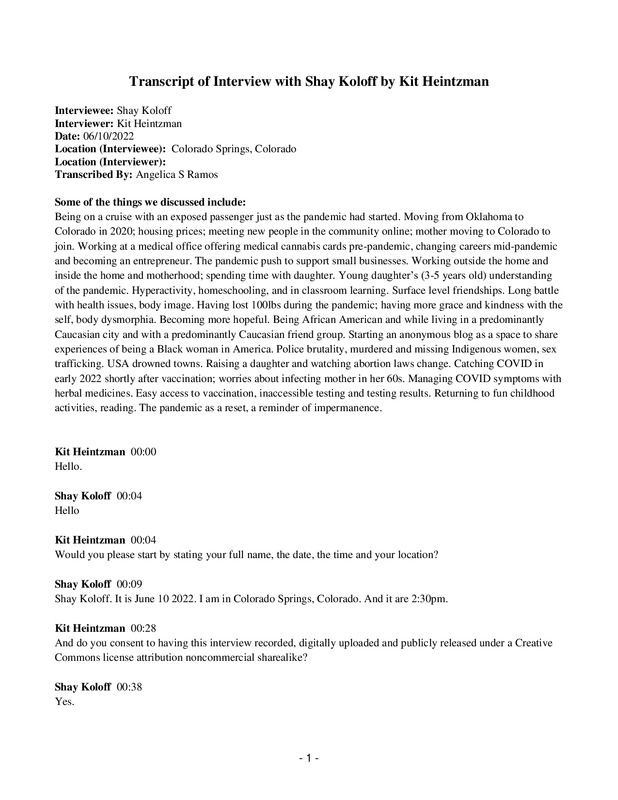
2022-06-10
Self Description: "my name is Shay Koloff, and I am a master entrepreneurs, a creative a person who really has no rhyme or reason or plan, but can make things happen. That's who I am"
-
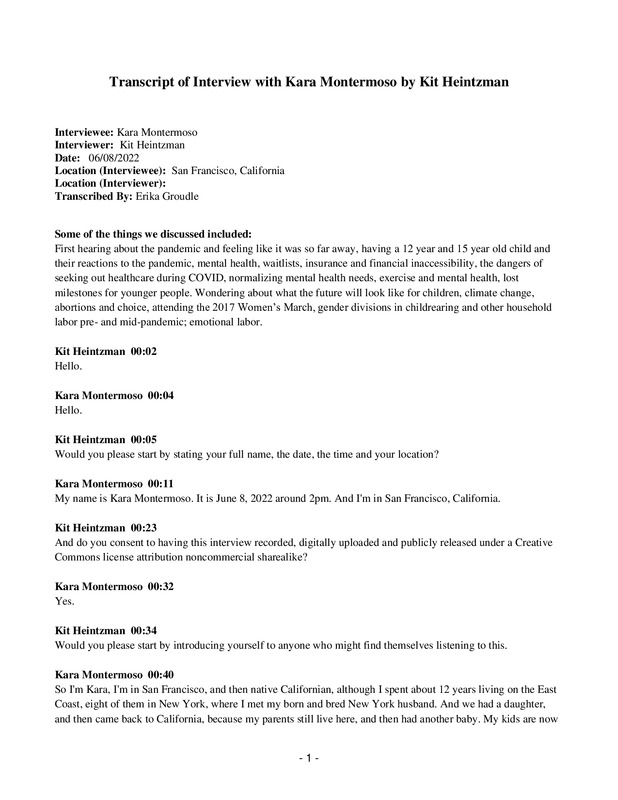
2022-06-08
Self Description: "So I'm Kara, I'm in San Francisco, and then native Californian, although I spent about 12 years living on the East Coast, eight of them in New York, where I met my born and bred New York husband. And we had a daughter, and then came back to California, because my parents still live here, and then had another baby. My kids are now 15, and 12. So there's been a lot of life changes in the decade or so. I also worked full time. I've been working full time, since I could work. And definitely during COVID. Some interesting tidbit is I've been working remotely for the last 15 years. So all the new things that came about in COVID, with remote work were not new to me. It was very interesting to watch, a mass movement of people sort of like walk into that into that life and into that lifestyle, albeit under very different circumstances than I did. And I, what I do for a living is not really the career I fell into working sort of administrative HR, Chief of Staff sorts of things at a nonprofit is not really where I ever saw myself. I never saw myself as a career person at all. And in light of that, I do a couple of things on the side. We're in the gig economy. So you know, that's the thing and these days. So I do a lot of youth sports coaching. That's really like where my passion is. I'm a yoga instructor. I studied massage therapy. At one point, I was a massage therapist at one point. I have hopes of writing a book at some point in my life. I don't know that's about it."
-
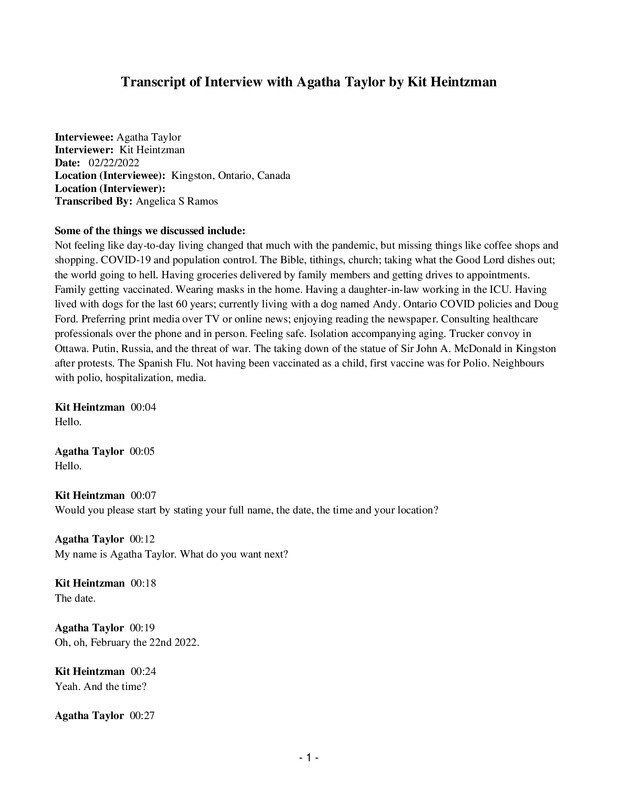
2022-02-22T09
Agatha Taylor
Self description:
“I’m 92. I live by myself with a little dog. I was born in Kingston; I’ve lived here all my life. I’ve lived in this house for almost 70 years.”
Some of the things we spoke about include:
Not feeling like day-to-day living changed that much with the pandemic, but missing things like coffee shops and shopping
COVID-19 and population control
The Bible, tithings, church; taking what the Good Lord dishes out; the world going to hell
Having groceries delivered by family members and getting drives to appointments
Family getting vaccinated
Wearing masks in the home
Having a daughter-in-law working in the ICU
Having lived with dogs for the last 60 years; currently living with a dog named Andy
Ontario COVID policies and Doug Ford
Preferring print media over TV or online news; enjoying reading the newspaper
Consulting healthcare professionals over the phone and in person
Feeling safe
Isolation accompanying aging
Trucker convoy in Ottawa
Putin, Russia, and the threat of war
The taking down of the statue of Sir John A. McDonald in Kingston after protests
The Spanish Flu
Not having been vaccinated as a child, first vaccine was for Polio
Neighbours with polio, hospitalization, media
Other cultural reference: The Hunt (2006) by Allison Brennen
After thoughts from Agatha Taylor: “man proposes and god disposes.” And “The God Lord only gives you so many days and when your time is up it’s up.”
-
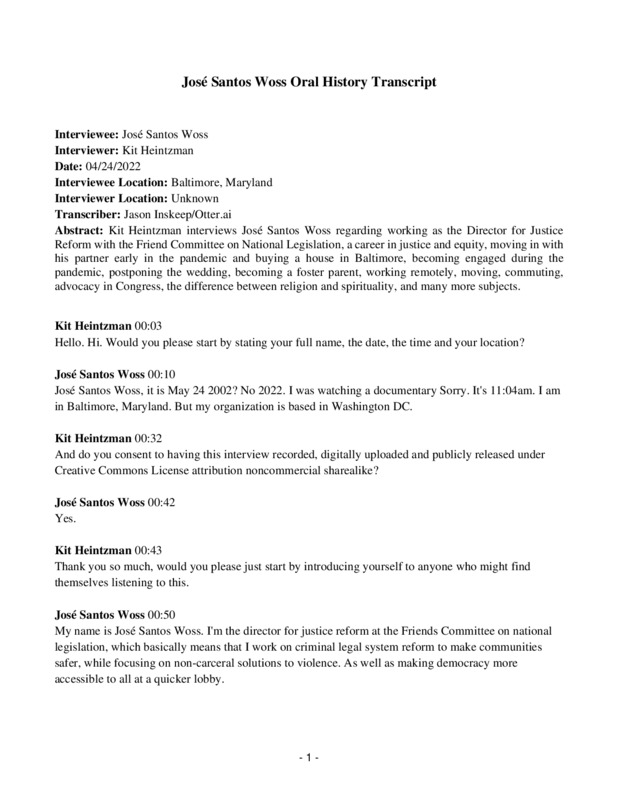
2022-05-24
Self Description: "My name is José Santos Woss. I'm the director for justice reform at the Friends Committee on national legislation, which basically means that I work on criminal legal system reform to make communities safer, while focusing on non-carceral solutions to violence. As well as making democracy more accessible to all at a quicker lobby."
-
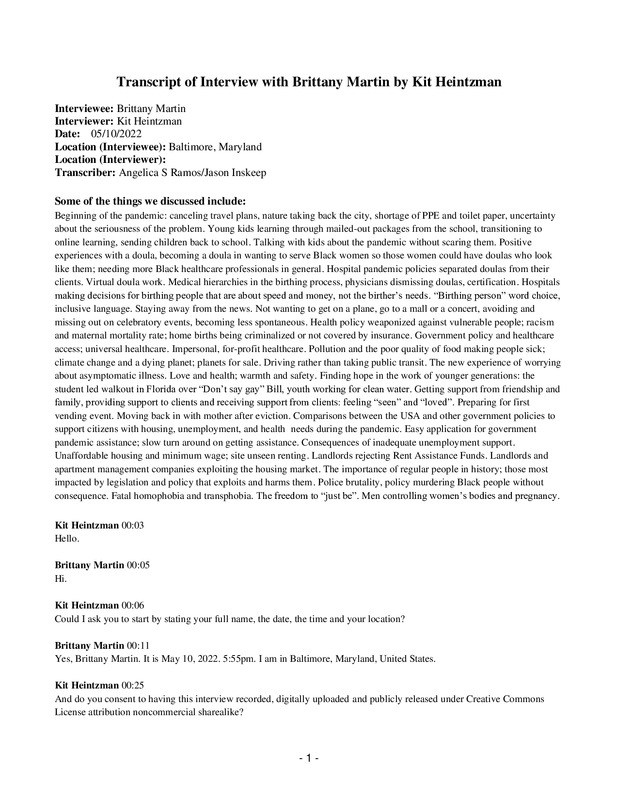
2022-05-10
Some of the things we discussed include:
Beginning of the pandemic: canceling travel plans, nature taking back the city, shortage of PPE and toilet paper, uncertainty about the seriousness of the problem
Young kids learning through mailed-out packages from the school, transitioning to online learning, sending children back to school
Talking with kids about the pandemic without scaring them
Positive experiences with a doula, becoming a doula in wanting to serve Black women so those women could have doulas who look like them; needing more Black healthcare professionals in general
Hospital pandemic policies separated doulas from their clients
Virtual doula work
Medical hierarchies in the birthing process, physicians dismissing doulas, certification
Hospitals making decisions for birthing people that are about speed and money, not the birther’s needs
“Birthing person” word choice, inclusive language
Staying away from the news
Not wanting to get on a plane, go to a mall or a concert, avoiding and missing out on celebratory events, becoming less spontaneous
Health policy weaponized against vulnerable people; racism and maternal mortality rate; home births being criminalized or not covered by insurance
Government policy and healthcare access; universal healthcare
Impersonal, for-profit healthcare
Pollution and the poor quality of food making people sick; climate change and a dying planet; planets for sale
Driving rather than taking public transit
The new experience of worrying about asymptomatic illness
Love and health; warmth and safety
Finding hope in the work of younger generations: the student led walkout in Florida over “Don’t say gay” Bill, youth working for clean water
Getting support from friendship and family, providing support to clients and receiving support from clients: feeling “seen” and “loved”
Preparing for first vending event
Moving back in with mother after eviction
Comparisons between the USA and other government policies to support citizens with housing, unemployment, and health needs during the pandemic
Easy application for government pandemic assistance; slow turn around on getting assistance
Consequences of inadequate unemployment support
Unaffordable housing and minimum wage; site unseen renting
Landlords rejecting Rent Assistance Funds
Landlords and apartment management companies exploiting the housing market
The importance of regular people in history; those most impacted by legislation and policy that exploits and harms them
Police brutality, policy murdering Black people without consequence
Fatal homophobia and transphobia
The freedom to “just be”
Men controlling women’s bodies and pregnancy
Other cultural references: Beyonce, Lysol, Saturday Night Live, Florida’s HB 1557, Baltimore Gas and Electric, Baltimore Birth Festival (https://marylandfamiliesforsafebirth.org/event/new-2nd-annual-baltimore-birth-festival-may-15-2022/), Love After Lockup, Pearl Burk’s “the test of a civilization is the way that it cares for its helpless members”
See also:
https://www.msfdoula.com
-
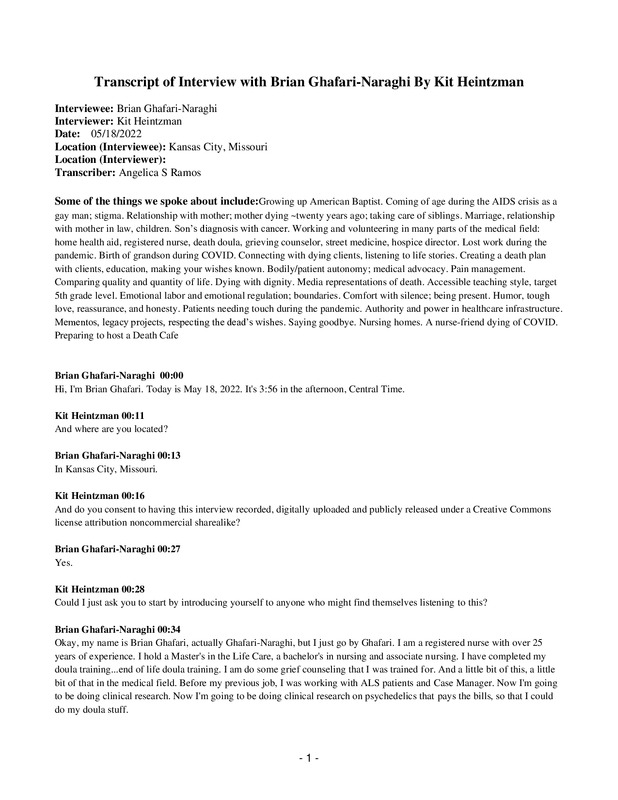
2022-05-18
Self Description: ". I am a registered nurse with over 25 years of experience. I hold a Master's in the Life Care, a bachelor's in nursing and associate nursing. I have completed my doula training...end of life doula training. I am do some grief counseling that I was trained for. And a little bit of this, a little bit of that in the medical field. Before my previous job, I was working with ALS patients and Case Manager. Now I'm going to be doing clinical research. Now I'm going to be doing clinical research on psychedelics that pays the bills, so that I could do my doula stuff."
-
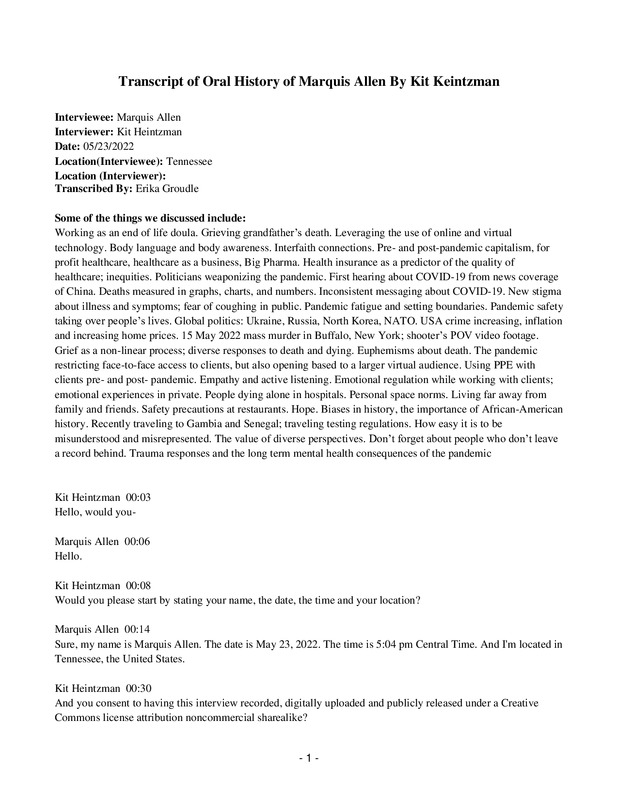
2022-05-23
Self Description: "I'm a certified end of life doula. And I have been trained both within the United States and within the United Kingdom. I'm a member of several end of life doula associations, and I really believe in what I do. And I believe in trying to support others to the best of my ability. And what really brought me into this field, actually was the passing of my grandfather. And I actually did not have time to grieve. And so after doing research, I found that there was a such thing as an end of life doula, and that's really what got me on my way. So I founded Serene Transitions End of Life Doula Services LLC. I founded that after going through some motions, when it came to grieving with my grandfather, and then I really just took off running. So that's just a little bit about me."
-
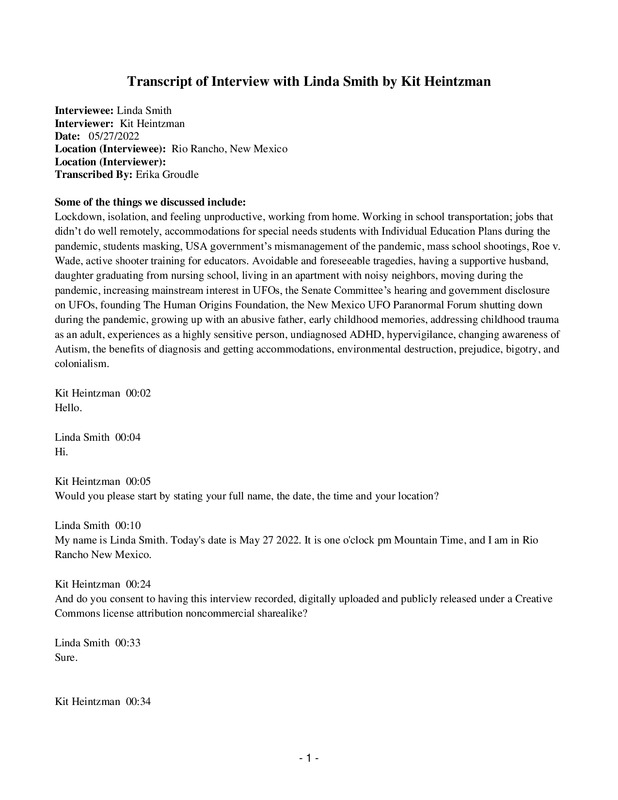
2022-05-27
Self Description: "I am a 58 year old woman who has had some very strange experiences in my life. I'm a mother of three grandmother of 1 2 3 5 I had to count their weight. No, yes. 1 2 3 4. Yes, five. And I am a published author, I wrote a book about my UFO experiences, my family's UFO experiences, including my children. My husband and I both have had experiences together. And we both are, in a sense, UFO investigators. Not active but we have been doing this for about 30 years."
-
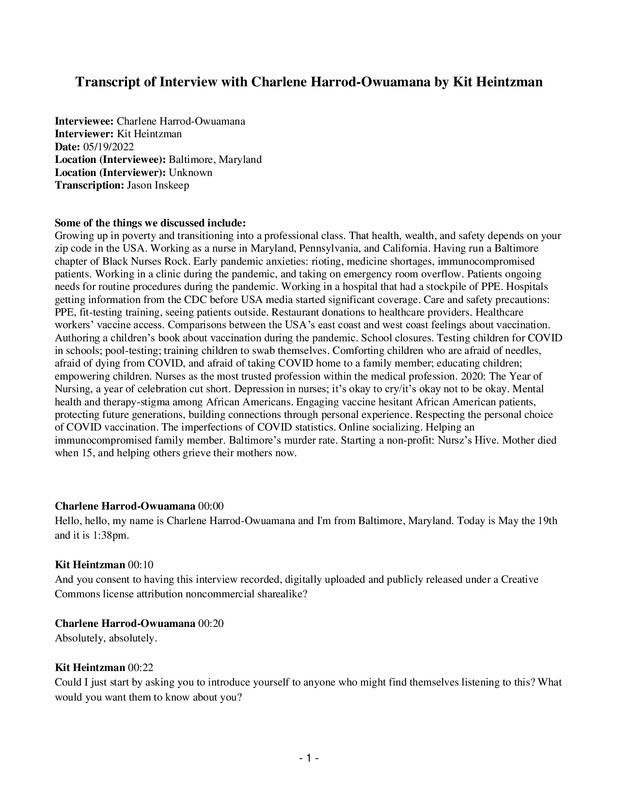
2022-05-19
Self Description: "My name is Charlene Harrod-Owuamana, I have been a nurse for 19 years. I'm a pediatric nurse, actually. And I'm during COVID I've taken a travel assignment in California, that I was so excited about that I wrote a book about it for COVID vaccine with vaccine versus shots."
-
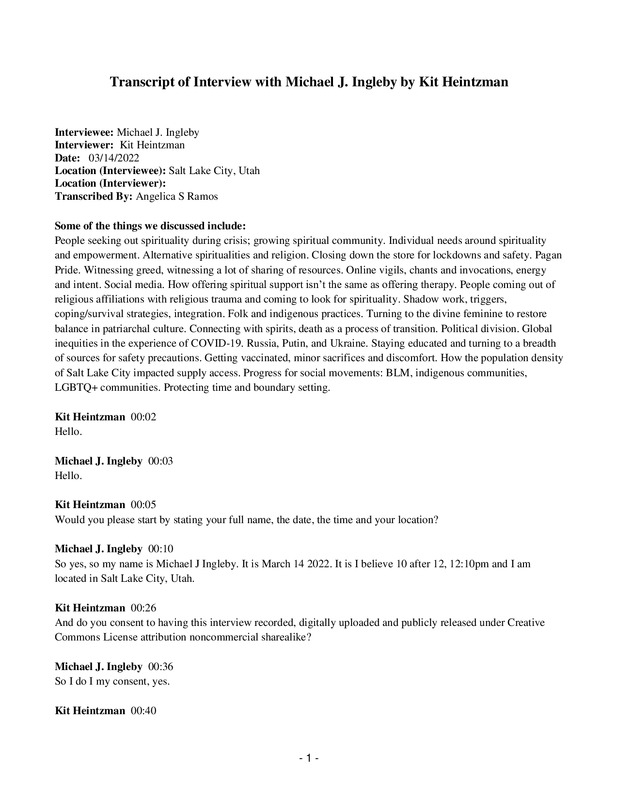
2022-03-14
Self Description: "Well, so I guess a good place to start is I am a long practicing professional spiritualist and witch, and I, I kind of work out of this business here I own a metaphysical shop in it's actually in Taylorsville, Utah, which is kind of a suburb of Salt Lake City. And, and then I kind of oversee the operation here, we kind of run a small spiritual center here and I oversee kind of a team of other practitioners that offer a variety of different types of well, you know, psychics mediums, people that do energetic healing work, these kinds of things. Yes. So and I've been doing this a really long time, actually, yeah, I'm, I'm, I'd say I'm fairly well established in this area, at least as anybody in my line of business could be."
-
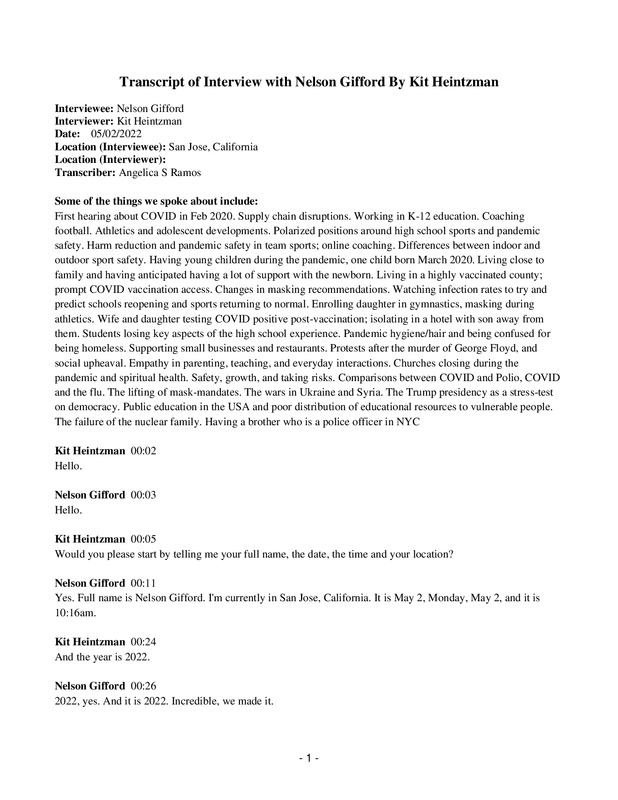
2022-05-02
Self Description: "Well, professionally, I'm a teacher, educator and K 12. High School. I've been in K 12 education since 2010. So you know, going on, you know, 12 years. I'm also a football coach. I've been doing that longer since 2003. And so those are my two professional passions, and you know, what I hope to continue to be doing in the near future and beyond. I'm also married, I have two kids, two and a four year old, including a two year old who was born nine days after California went on lockdown. So it was born on March 22. And it went on lockdown March 13. So my whole COVID references based around how old he is."
-
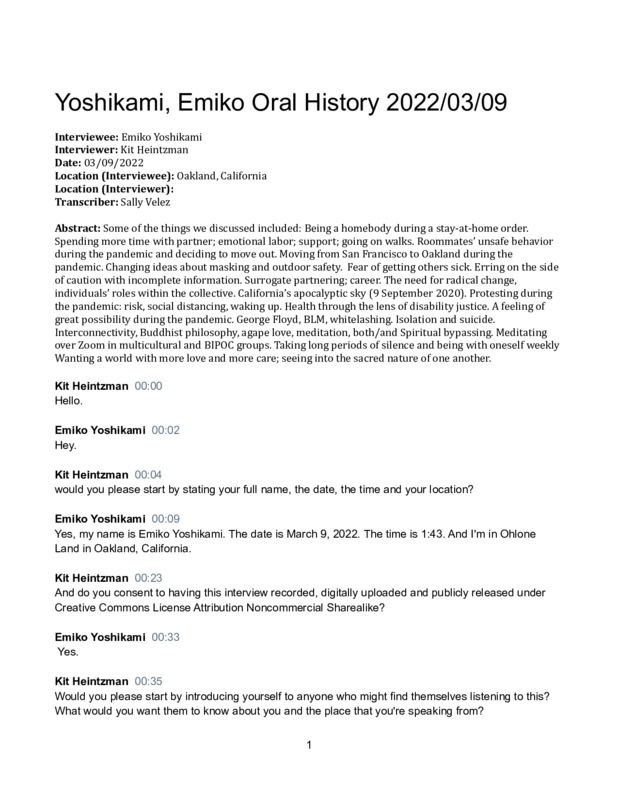
2022-03-09T13:43
Self Description: "Oh, my goodness. I have no idea what people would want to know. I don't know what people would be interested in. Um, I could guess maybe, I'm 40 years old. I'm mixed race, Japanese and white. I- just to throw it out there, I'm a meditator. I have a spiritual practice. And, let's see, I thought of other things people might want to know. But now I forget. Yeah, if I, if something comes to me, I wish people could just ask me, I'm kind of an open book."
-
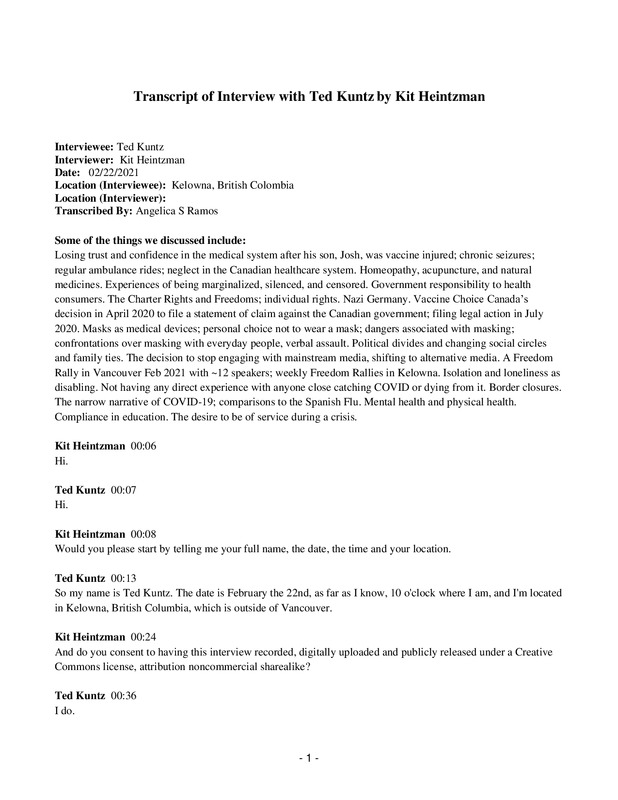
2021-02-22
Self-description:
“I’m a parent of a young man that was severely vaccine injured. So what I bring to the conversation is the experience of vaccine injury, that has dramatically changed my life and has put me on a path where I became an advocate for informed consent in my country. I’m currently the president of Vaccine Choice Canada, and our mandate is both to educate health consumers about the risks of vaccination as well as protect and preserve our right to informed consent.”
-
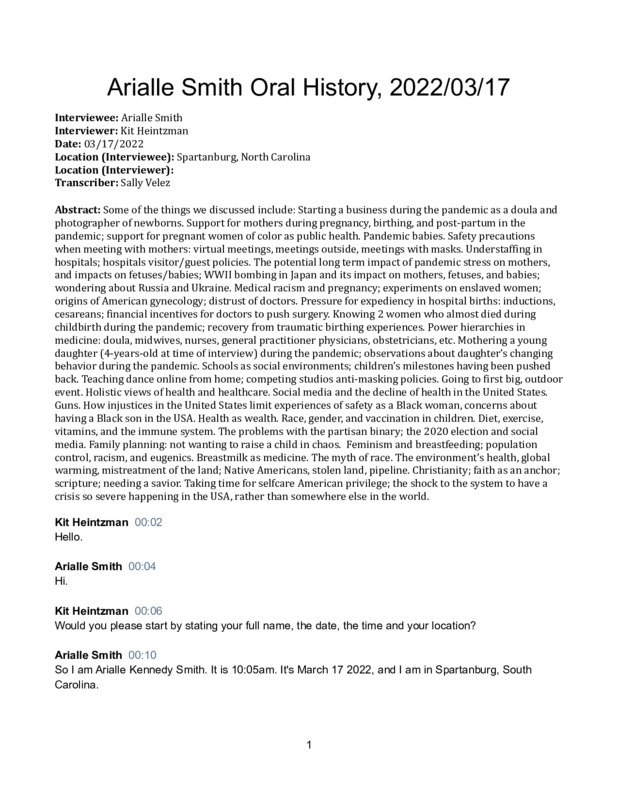
2022-03-17T10:05
Self-description:
“I am a mother. I’m a wife. I’m a doula. And I’ve always found myself at the intersection of serving my community, and working with families from more of a nurturing perspective. I’ve been working with children, honestly, since I was 18. So that’s been about 18 years now. I’ve been able to kinda see the progression of both babies to children, adolescents, young adults, teenagers. It seemed like there was a transition in the ages, especially from when I grew up. And so I feel like this time, during this season, during this time, during this pandemic, it definitely has brought on different challenges and different changes in our society, particularly around those areas: concerning children, concerning giving birth. There’s definitely some things that I’ve seen and experienced firsthand when considering the changes that the pandemic has brought about. I really think that now with the advancement of this age, and we have so much access to information and technology, I still find that the holistic practices that I’m able to participate in and to employ with my clients is still superior to anything that has come out.”
-
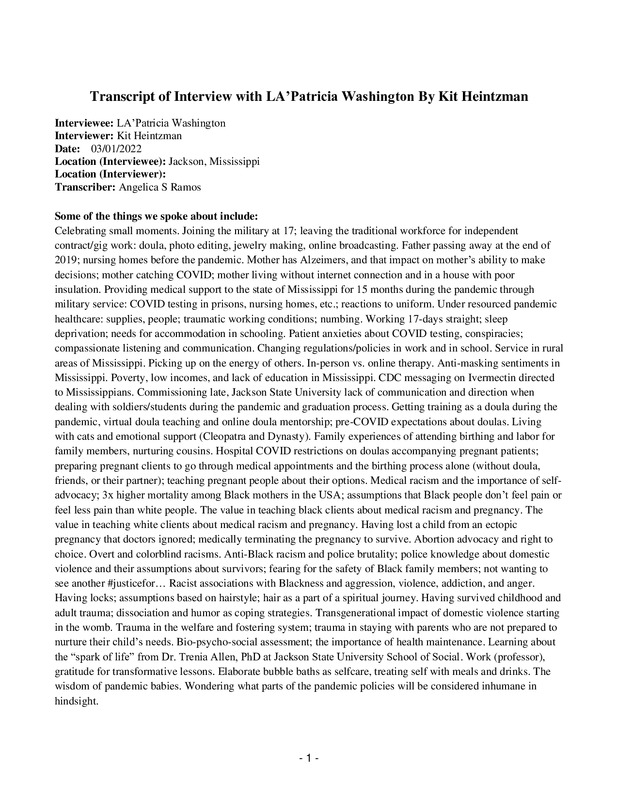
2022-03-01
Self Description: “I am 30 years old. I am a soldier in the military. I have obtained my Masters in social work. I am a birthing doula currently. I have a background in child welfare, mental health, forensics, social work, geriatrics care. And I have been an Emergency Medical Technician-Basic for the past 12 years.”
-
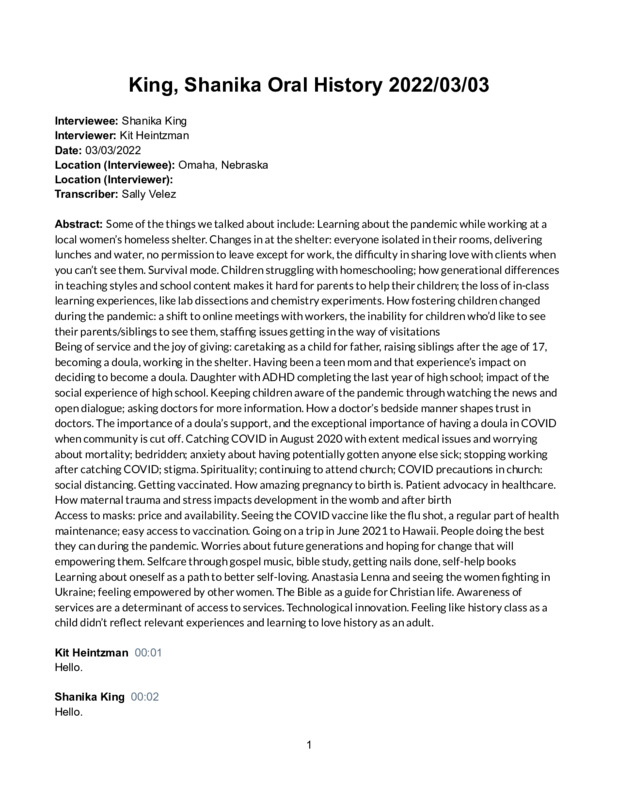
2022-03-03
Self-description:
“My name is Shanika King. I am a mom. I’m a doula. I am a leader in my community. And, yeah, I love people. I love this world. I love birthing moms. I’m just an all around loveable person.”
-
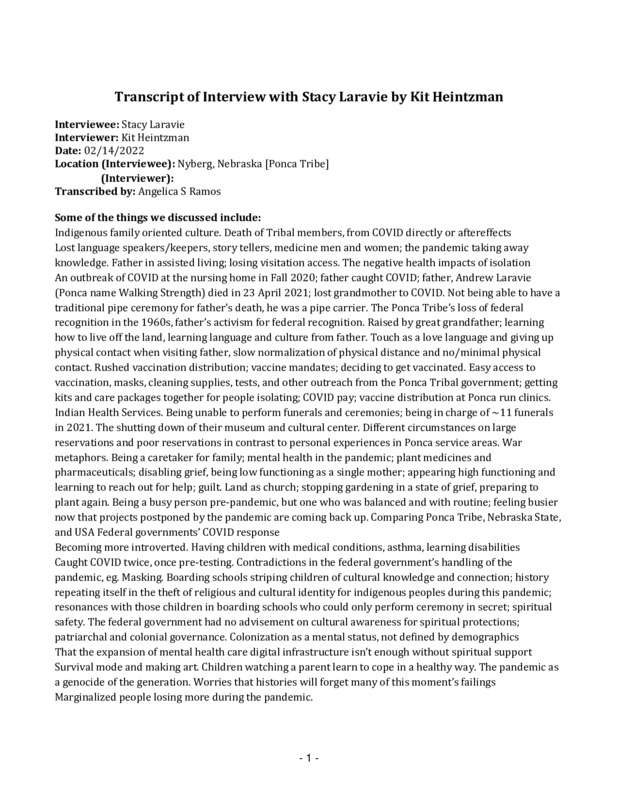
2022-02-14
Self description:
“I introduced myself traditionally. I am a Ponca member, as well as I work for my Tribe. I am the Tribal Historic Preservation Officer. And I am also the museum curator, and many many other hats. I am also a direct descendent of Chief Standing Bear. And I’m a mom.”
Some of the things we spoke about included:
Indigenous family oriented culture
Death of Tribal members, from COVID directly or aftereffects
Lost language speakers/keepers, story tellers, medicine men and women; the pandemic taking away knowledge
Father in assisted living; losing visitation access
The negative health impacts of isolation
An outbreak of COVID at the nursing home in Fall 2020; father caught COVID; father, Andrew Laravie (Ponca name Walking Strength) died in 23 April 2021; lost grandmother to COVID
Not being able to have a traditional pipe ceremony for father’s death, he was a pipe carrier
The Ponca Tribe’s loss of federal recognition in the 1960s, father’s activism for federal recognition
Raised by great grandfather; learning how to live off the land, learning language and culture from father
Touch as a love language and giving up physical contact when visiting father, slow normalization of physical distance and no/minimal physical contact
Rushed vaccination distribution; vaccine mandates; deciding to get vaccinated
Easy access to vaccination, masks, cleaning supplies, tests, and other outreach from the Ponca Tribal government; getting kits and care packages together for people isolating; COVID pay; vaccine distribution at Ponca run clinics
Indian Health Services
Being unable to perform funerals and ceremonies; being in charge of ~11 funerals in 2021
The shutting down of their museum and cultural center
Different circumstances on large reservations and poor reservations in contrast to personal experiences in Ponca service areas
War metaphors
Being a caretaker for family; mental health in the pandemic; plant medicines and pharmaceuticals; disabling grief, being low functioning as a single mother; appearing high functioning and learning to reach out for help; guilt
Land as church; stopping gardening in a state of grief, preparing to plant again
Being a busy person pre-pandemic, but one who was balanced and with routine; feeling busier now that projects postponed by the pandemic are coming back up
Comparing Ponca Tribe, Nebraska State, and USA Federal governments’ COVID response
Becoming more introverted
Having children with medical conditions, asthma, learning disabilities
Caught COVID twice, once pre-testing
Contradictions in the federal government’s handling of the pandemic, eg. masking
Boarding schools striping children of cultural knowledge and connection; history repeating itself in the theft of religious and cultural identity for indigenous peoples during this pandemic; resonances with those children in boarding schools who could only perform ceremony in secret; spiritual safety
The federal government had no advisement on cultural awareness for spiritual protections; patriarchal and colonial governance
Colonization as a mental status, not defined by demographics
That the expansion of mental health care digital infrastructure isn’t enough without spiritual support
Survival mode and making art
Children watching a parent learn to cope in a healthy way
The pandemic as a genocide of the generation
Worries that histories will forget many of this moment’s failings
Marginalized people losing more during the pandemic
Other cultural references include: NAGPRA, University of Nebraska Medical Center, Zoom, memes
See also:
https://www.poncatribe-ne.org/culture/historic-preservation/
https://www.wowt.com/2021/10/08/standing-bear-high-school-breaks-ground-with-descendants-attendance/
https://nativeamericacalling.com/friday-february-18-2022-the-worst-date-ever/
https://www.ashburnfh.com/obituaries/print?o_id=7453898
-
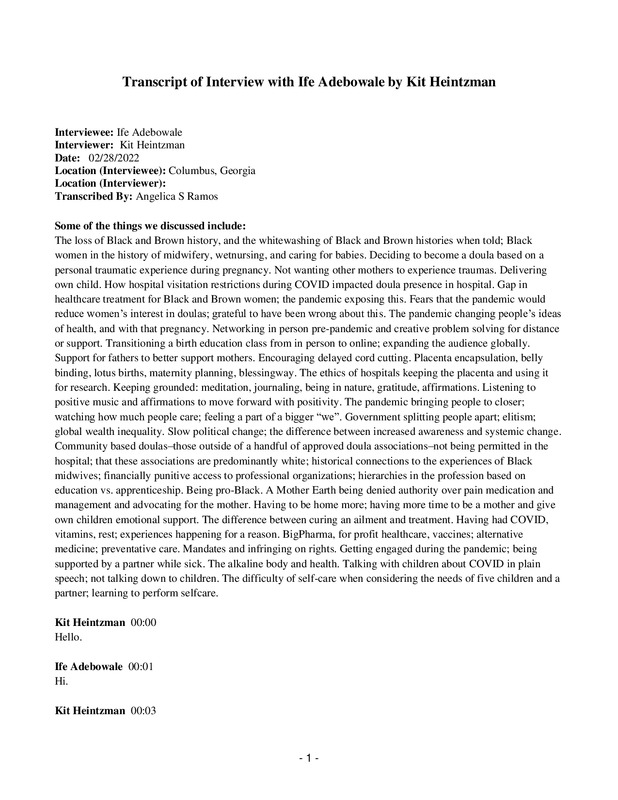
2022-02-28
Self-description:
“Good morning, good afternoon, or good evening to anyone that is listening. Again my name is Ife Adebowale and I am the founder and owner of Cherishing Life Beginnings Doula, Birth, and Educational Services, LLC here in Columbus, Georgia. Our mission here in Columbus, Georgia right now, we are a community based service organization, so, our mission here in Columbus, Georgia is to be able to provide low cost affordable care to those mothers that aren’t able to afford a doula or a birthworker in general. We are here to aid with alleviating the systematic and structural racism in the healthcare system, and we are also here to just be advocates. We are a organization that is advocate of home births, natural births and assisted, and advocates for breastfeeding. In a nutshell we are here anything and everything that a Mother Earth needs while she is going through pregnancy, labor, and postpartum.”
-
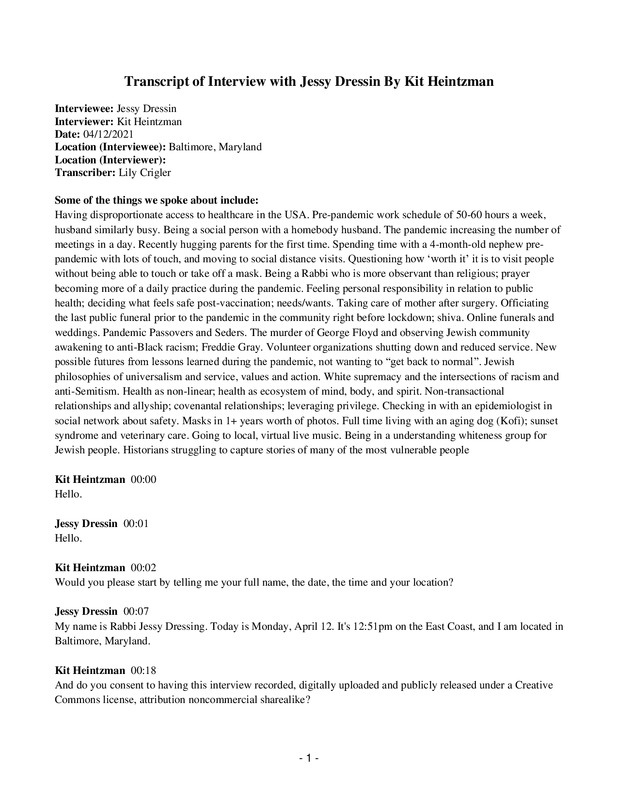
2021-04-12
Self description: “I am speaking from the place of being a person who has been blessed to have a roof over my head, has been employed, and has, thank God, mostly been healthy during this last year. I speak as a Rabbi and somebody who has always been, and especially in the last year, been a point of pastoral support for folks, a point of outreach for those who have been in need in a variety of circumstances. I speak as an educator. I speak as the executive director of a nonprofit organization that engages in service and volunteering to address needs, specifically in areas of food insecurity and education disparity, which over the course of this last year has been even more exacerbated even more than it was before the pandemic. And, I speak from a place of being a creative that has tried to dig deep into this time knowing that future generations will want to know of this time. And so whether through visual arts or through writing or through testimonies like this one, I speak from a place of knowing that our stories and the way we’ve moved through this time will be of interest to folks for many many generations and years to come. ”
-
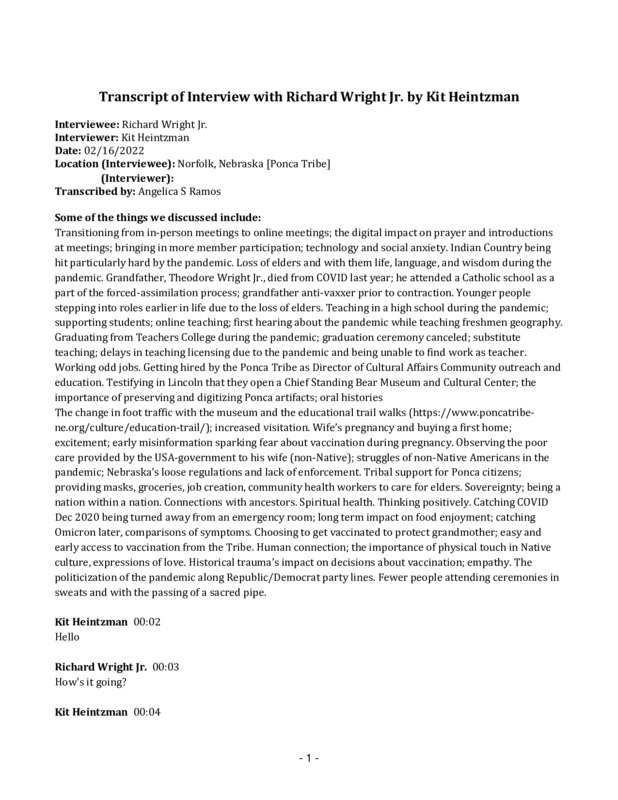
2022-02-16
Self Description: “I currently work for the Ponca Tribe of Nebraska. I am also a Ponca member, an enrolled member of the Tribe. Basically what I do is a lot; I wear a lot of hats. Overseeing our museum is one of the things I focus on among many other things, our pow wow, annual pow wow every year in August. Just making sure everything goes smoothly and runs accordingly as far as focusing on the budget finances are all correct, we’re spending the money properly. I also oversee our Tribal Historic Preservation Officer and soon to be our Tribal Historian, which we’ll be adding to our staff. I love what I do and I’m here for my people.”
-
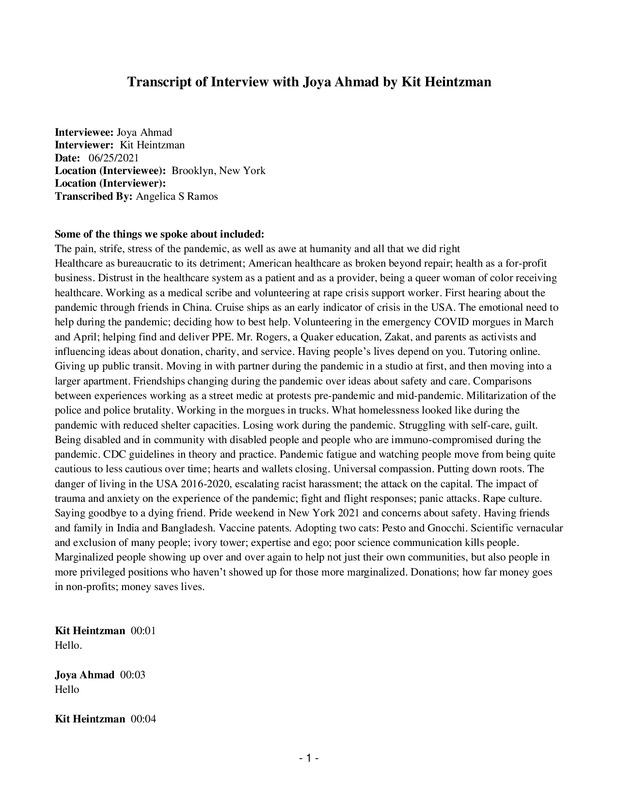
2021-06-25
Self-description: “I think the most pandemic relevant thing about me is that I run a national nonprofit called MedSupplyDrive that does PPE donations across the country, as well as doing health equity education for high schoolers. So I’m one of the national logistics directors; I’ve been in that position since April of 2020, though I started working with the organization in March. So, I’ve been in this seat for kind of as long as the US has been experiencing the pandemic. The other hat that I wear that’s been particularly salient is that I’m a medical student, I’m a rising first year, and have been operating in various healthcare roles or healthcare adjacent roles: I was a scribe, I’ve been street medic, I’m a crisis counselor. I spend a lot of time in healthcare space and a lot of time in nonprofit PPE space.”
-
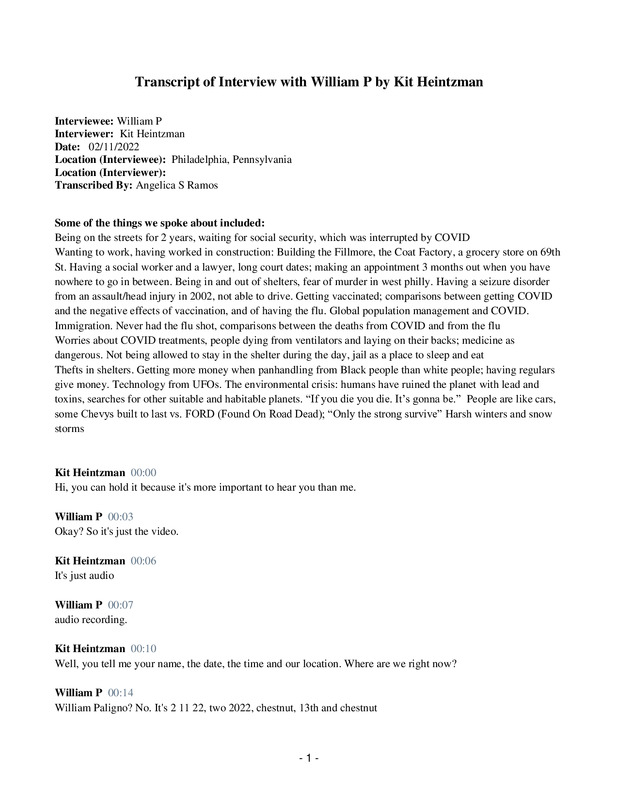
2022-02-11
Self Description: "I've been on the streets here like two years now waiting for security but COVID Actually, they stopped it. And they actually stopped it for like a year. So now I gotta go see the doctors over again and everything. So now I'm going to shelter xe at least now I but I stayed in the shelter and five months."
-
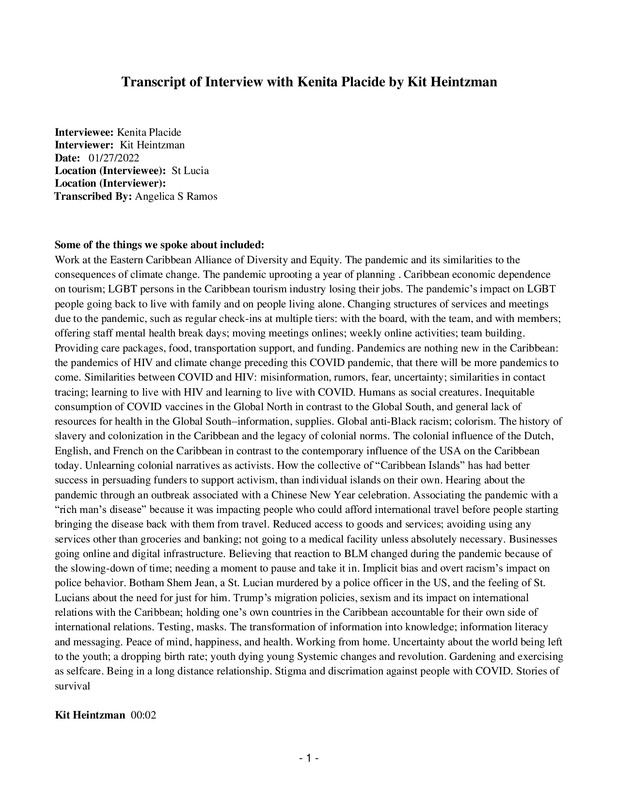
2022-01-27
Self description:
“For much too long I guess that’s a question that I always ran away from, I think. I was born to the native island of St. Lucia. I work across the Eastern Caribbean. To my family I am my mother’s last child, I am the fifth born of the family. And I have been in activism for over 16 years. I don’t particularly like labels. But I think the label that most recently I felt a little more comfortable with is somewhere along the lines of non-binary, you know gender nonconforming kind of label; but only if and when necessary. I still prefer absolutely no labels if I can pass with it. I think my work has been, for the last 15 years, predominantly working on the advancement and rights of LGBT persons. Currently I’m over 45, still looking like 25, so I’m thankful for that. I think I’ve created a global family. So I could call, almost in any country, where there is someone I would call a friend or chosen family over the last couple years of engagement in activism.”
Some of the things we spoke about included:
Work at the Eastern Caribbean Alliance of Diversity and Equity
The pandemic and its similarities to the consequences of climate change
The pandemic uprooting a year of planning
Caribbean economic dependence on tourism; LGBT persons in the Caribbean tourism industry losing their jobs
The pandemic’s impact on LGBT people going back to live with family and on people living alone
Changing structures of services and meetings due to the pandemic, such as regular check-ins at multiple tiers: with the board, with the team, and with members; offering staff mental health break days; moving meetings onlines; weekly online activities; team building
Providing care packages, food, transportation support, and funding
Pandemics are nothing new in the Caribbean: the pandemics of HIV and climate change preceding this COVID pandemic, that there will be more pandemics to come
Similarities between COVID and HIV: misinformation, rumors, fear, uncertainty; similarities in contact tracing; learning to live with HIV and learning to live with COVID
Humans as social creatures
Inequitable consumption of COVID vaccines in the Global North in contrast to the Global South, and general lack of resources for health in the Global South–information, supplies
Global anti-Black racism; colorism
The history of slavery and colonization in the Caribbean and the legacy of colonial norms
The colonial influence of the Dutch, English, and French on the Caribbean in contrast to the contemporary influence of the USA on the Caribbean today
Unlearning colonial narratives as activists
How the collective of “Caribbean Islands” has had better success in persuading funders to support activism, than individual islands on their own
Hearing about the pandemic through an outbreak associated with a Chinese New Year celebration
Associating the pandemic with a “rich man’s disease” because it was impacting people who could afford international travel before people starting bringing the disease back with them from travel
Reduced access to goods and services; avoiding using any services other than groceries and banking; not going to a medical facility unless absolutely necessary
Businesses going online and digital infrastructure
Believing that reaction to BLM changed during the pandemic because of the slowing-down of time; needing a moment to pause and take it in
Implicit bias and overt racism’s impact on police behavior
Botham Shem Jean, a St. Lucian murdered by a police officer in the US, and the feeling of St. Lucians about the need for just for him
Trump’s migration policies, sexism and its impact on international relations with the Caribbean; holding one’s own countries in the Caribbean accountable for their own side of international relations
Testing, masks
The transformation of information into knowledge; information literacy and messaging
Peace of mind, happiness, and health
Working from home
Uncertainty about the world being left to the youth; a dropping birth rate; youth dying young
Systemic changes and revolution
Gardening and exercising as selfcare
Being in a long distance relationship
Stigma and discrimation against people with COVID
Stories of survival
Cultural references:
OutRight International’s COVID Emergency Funds, GlobalGiving funding platform, Netflix, Zoom, Whatsapp
-
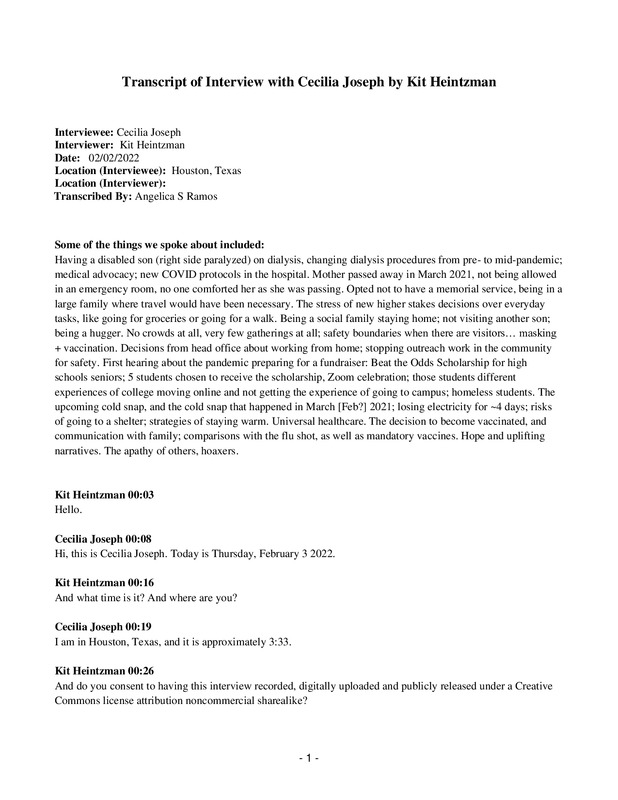
2022-02-03
Self-description
“I live in Houston, Texas. I call myself a seasoned saint, ‘cause I’m 60+, 65+. I live at home with my husband who is disabled, and my son; one of my sons is disabled. [I have two sons at home, and one is disabled.] And I work for a non-profit agency that does CHIP [Children’s Health Insurance Program] and children’s and Medicaid advocacy.”
Some of the things we spoke about included:
Having a disabled son (right side paralyzed) on dialysis, changing dialysis procedures from pre- to mid-pandemic; medical advocacy; new COVID protocols in the hospital
Mother passed away in March 2021, not being allowed in an emergency room, no one comforted her as she was passing
Opted not to have a memorial service, being in a large family where travel would have been necessary
The stress of new higher stakes decisions over everyday tasks, like going for groceries or going for a walk
Being a social family staying home; not visiting another son; being a hugger
No crowds at all, very few gatherings at all; safety boundaries when there are visitors… masking + vaccination
Decisions from head office about working from home; stopping outreach work in the community for safety
First hearing about the pandemic preparing for a fundraiser: Beat the Odds Scholarship for high schools seniors; 5 students chosen to receive the scholarship, Zoom celebration; those students different experiences of college moving online and not getting the experience of going to campus; homeless students
The upcoming cold snap, and the cold snap that happened in March [Feb?] 2021; losing electricity for ~4 days; risks of going to a shelter; strategies of staying warm
Universal healthcare
The decision to become vaccinated, and communication with family; comparisons with the flu shot, as well as mandatory vaccines
Hope and uplifting narratives
The apathy of others, hoaxers
Other cultural references include: Maya Angelou, Lysol, Macy’s, Zoom, Sidney Poitier, James Baldwin
-
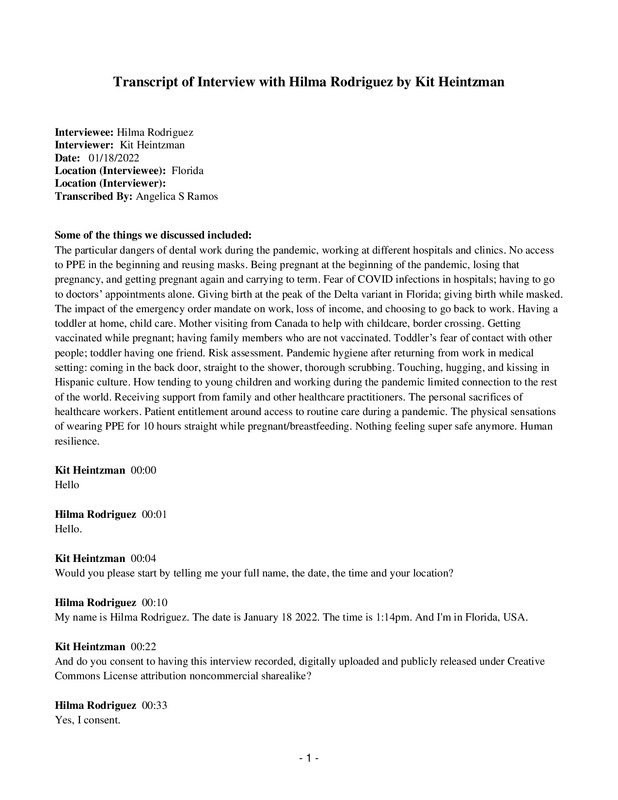
2022-01-08
Self-description: “I work as a healthcare worker, I’m a pediatric dentist. I’m coming from that perspective. I’m coming in from the perspective of a mother. And also as somebody who needed healthcare during the pandemic.”
-
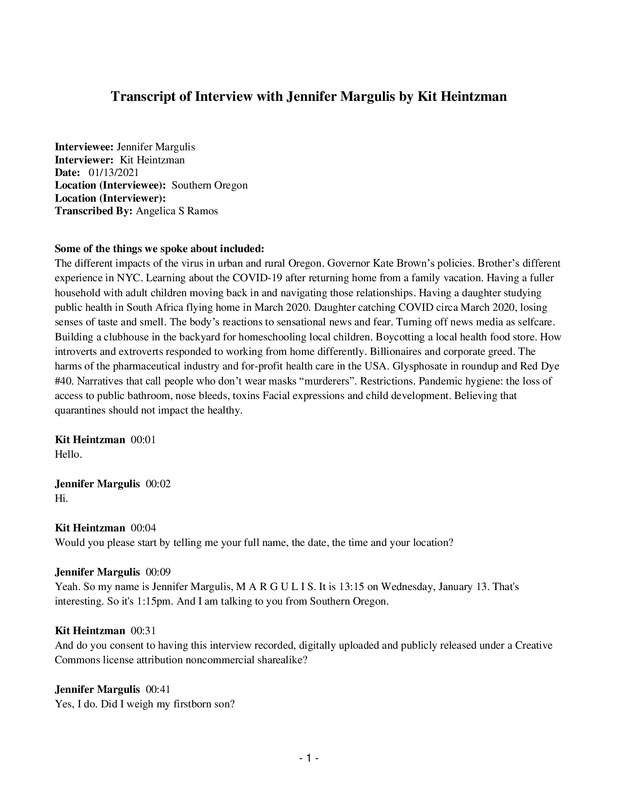
2021-01-13T13:15
Self description:
“I’m a investigative journalist and a science writer. I’ve been researching and writing about issues related to health topics for over 15 years. And I have written, or co-written 8 books, I just submitted my 9th manuscript to Houghton Mifflin Harcourt. I’d want people to know that I'm an avid researcher. I do have a PhD, but my PhD is in the humanities. And that I’m very well versed in issues that have to do with health.”
-
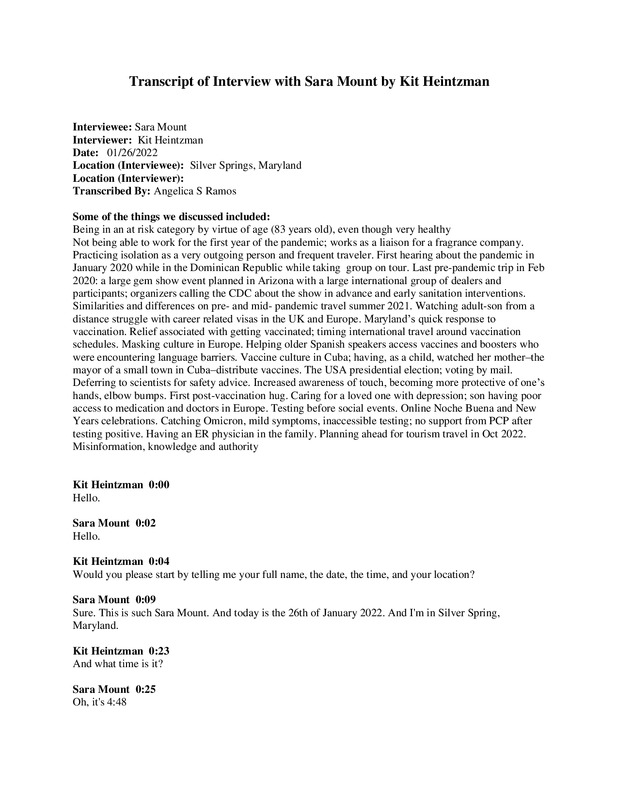
2022-01-26
Self-description: “I’m somebody that has been affected quite a bit by the pandemic, has kept my work schedule down a lot. But you know, outside of that fact that I have not been able to be with my son as often as I would like too, I don’t feel like it has taken a huge toll on me. I’m sure it has, mentally. I’m a fairly optimistic person, so I tend to look on the good side.”
-
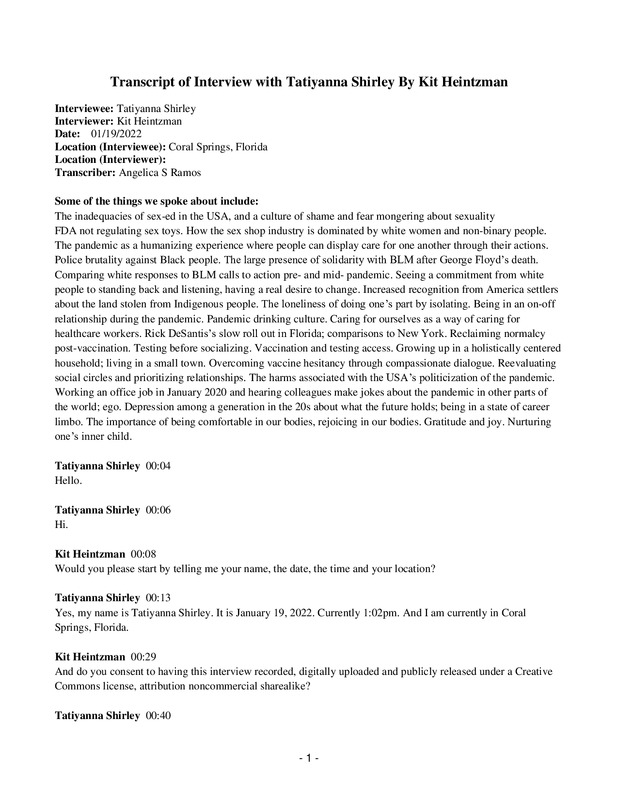
2022-01-19
Self Description:
“My name is Tatiyanna I’m a born and raised Floridian. I started a brand [Ardently] about two years ago. January actually, so the 2 year mark is right around the corner actually. January 2020, that was a few months before the pandemic hit, so I was very excited to start a business. I went in with no idea what I was really doing. I did some research, but overall it was my first time starting a business. And then 2 months later a pandemic hit and everything started to get really really weird for me. Especially as I was starting to navigate new territory as a business owner. And then what that looked like for a business owner during a pandemic. So, that’s a little bit about me… It’s an online business for adult toys, adult novelties, which is a really interesting field to get into especially…, actually something funny is that when the pandemic hit it was very frightening, and at the time I realized, eventually I came to realize that adult toys was a great industry to go into because no one had anything to do really except masturbate because no one was seeing each other, everyone was social distancing, and everyone was home bored, and so a lot of people ended up getting into their sexuality and exploring sexually. And there is research that shows the spike that the pandemic caused for sexual exploration. So that was honestly a pleasant surprise when I got into this industry; because trust me, that’s not what I was thinking. And I wanted everyone to masturbate more. I also talk about sexual wellness and I give sex advice and self-love advice and tips like that. So, you know, as I’m trying to understand how will I get people to be more comfortable in their skin, to want to explore their sexuality, their identities, their pleasure, and low and behold: everyone is at home and they’re touching themselves.”
-
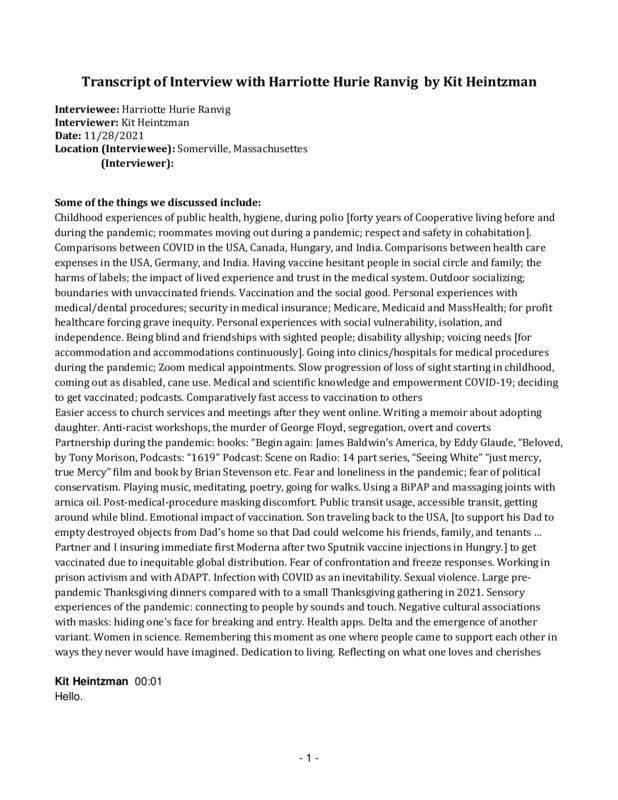
2021-11-28
Self-Description:
“I am 75 years-old and very comfortable with my age and my body. Not that the body is perfect, but I’m comfortable with it. I started losing my sight when I was 6 years old in the spring of my first grade year, in public school in Valdosta, Georgia. It was from a fall where I bumped the back of my head. I was already wearing glasses for being near-sighted, and the peculiar thing was I had a terrible headache and they checked me for concussion. But, as it turns out I had a full detachment from the right eye, which I as a child was not particularly aware of therefore it went untreated for quite some weeks. I lost the sight fully then with the right eye. Managed pretty well the left eye, except I had some cataracts and apparently a gradually detaching retina as well. I guess I saw colors and shapes until I was 11 or maybe 12. Difficult to remember, but I treasured light perception. And locating myself by paying attention to where windows were in any new space I was in. Apparently I could see enough to navigate a school 700 kids when I first went to Atlanta for 1 or 2 years to learn braille at what was then called the beginnings of mainstreaming… learning some skills for being blind, which at that time, I didn’t identify with at all. I laughingly say, “I was hard-of-seeing”. Mostly I didn’t get isolated except for some playground activities like softball, but on the other hand we also had ethnic dancing. And of course I sang at every opportunity. I also had private piano lessons, but had a horrible teacher, so that went by the way until high school. I tried to learn guitar, but my little fingers hurt too much. So, ostensibly I was homeschooled for five years as the youngest of the [four] children [in my family].
“I was homeschooled by my mother, in a sense by my father who read to me quite advanced things, like Dickens. And I also learned to touch type thanks to my mother’s color coded poster that I could manage to learn the home keys, probably the most major skill I got in my childhood. Let’s just say by the age of even 11 or 12 I’m sure I was more than legally blind, and I would consider myself blind by age 14 or 15, and I had light perception until I was 40. I didn’t actually perceive myself as “disabled” even as a blind person, because I thought being disabled meant –as a blind person–everything was all dark. And as I’ve already related, things were not all dark for me. So I never assumed, and this is certainly because I’m white and I grew up, my father was from poverty. My mother was from some inherited wealth, not really, very poor as a child. [from age 8 to 14 years old she lived in boarding houses with her mom who seem to become more and more delusional over time until her mom was committed to a state mental institution.]
“[Mom’s great aunts became her guardians.] when she started high school. [Thanks to her great aunts,] she had sufficient money to go to college. I was so lucky that my father was very successful, and one of his key goals was that his children, he could pay for excellent education, [for private high schools], at least through their Bachelors degree. And, that in itself in the 1950s and 1960s is pretty astounding. So after these two years I went off to a tiny boarding school where I was the first, maybe the only, blind student, and I think what strengthened me to be in the world as a person who was blind “disabled” was a certain confidence and joy that my mother certainly imbued in me, my father too to a degree, but my mother primarily. It was just second nature to me to teach my teachers and fellow students how to walk with me, how to work out assignments with me, etc. etc., because even though I learned braille, you couldn’t get any current literature that you just wanted to read in braille…. I was the first blind student in over 110 years when I went to Antioch College, and I went there because they promised a year in Europe and work experience in co-op jobs. And even though I got into Radcliffe, I turned them down like a 17-year-old naive girl might just do. I really never thought there was anything I could not do, and mama just had a belief that if you worked hard enough at a dream somehow you might be able to realize it. I was a folky too, I played guitar…
“I feel as though I’ve had 7 lifetimes in a lifetime. I’ve been married and divorced three times. Two of those times very amicably, and I’m close friends with both (of them. [My third husband was a dear friend young Indian who as a friend and lover of my husband who struggled deeply with depression. With out this friend, I have grave doubts we could have completed the 18 month legal and actual journey in India.] My first husband [introduced me to classical Hindustani music in north India, which made it possible for me to become a performer and teacher; the love of it has nourished me to the completion of my dissertation in 2009 and beyond] has been an important feature of my life, certainly up to the completion of my dissertation in ethnomusicology in 2009. I had two children with my second husband. The first was our biological son in ’85, and then we wanted a second child. But when he was an infant I had a herniated lumbar disk, and was kind of put out of work and everything else for four months. I decided I really wanted to save my body’s energy and adopt an Indian daughter. We managed to do that. We went back To India on my senior music research in (1989-91). I should say one last bit about that [earlier part of my life; just prior to the senior research grant period, I worked for five years] at the Massachusetts Office on Disability, then so ridiculously named the State Office of Handicapped Affairs. I mention that here because in the last 8 years I’ve returned to disability advocacy, I’ve taken it on as a real personal and volunteer activity, in a strong cross-disability fashion. So for example National ADAPT and Massachusetts ADAPT, especially National, was very much focused on individuals who were and are wheelchair users and often in need of certain amounts, or many hours, of personal care attendants [as well as affordable and accessible housing.] I think I might be one of two blind people in a national organization that I’m aware of. I’ve taken on civil rights non-violent actions [recently in the effort to keep the affordable care Act,] until the pandemic. [I enjoy playing traditional tunes on the recorder.] That’s how I met my true love Frank 18 years ago. He himself is 29-years my junior, but somehow age hasn’t gotten in our way. Leading a course in the prisons until the pandemic for three years on leadership and transformational thinking. It’s music at home. Enjoyment of cooking and in the kitchen. And yogurt and sourdough bread. I have had a [part time secretary] consistently since 1979, although during the pandemic I lost one for the whole year. Now I have a great one. Oh and I have been a volunteer doula [for friends, 15 times from 1989-2006].”
NB: Square brackets indicate Harriotte’s additions, some of which are not present in the interview but are a part of her story
Some of the things we talked about included:
Childhood experiences of public health, hygiene, during polio
[forty years of Cooperative living before and during the pandemic; roommates moving out during a pandemic; respect and safety in cohabitation]
Comparisons between COVID in the USA, Canada, Hungary, and India
Comparisons between health care expenses in the USA, Germany, and India
Having vaccine hesitant people in social circle and family; the harms of labels; the impact of lived experience and trust in the medical system
Outdoor socializing; boundaries with unvaccinated friends
Vaccination and the social good
Personal experiences with medical/dental procedures; security in medical insurance; Medicare, Medicaid and MassHealth; for profit healthcare forcing grave inequity
Personal experiences with social vulnerability, isolation, and independence
Being blind and friendships with sighted people; disability allyship; voicing needs [for accommodation and accommodations continuously]
Going into clinics/hospitals for medical procedures during the pandemic; Zoom medical appointments
Slow progression of loss of sight starting in childhood, coming out as disabled, cane use
Medical and scientific knowledge and empowerment COVID-19; deciding to get vaccinated; podcasts
Comparatively fast access to vaccination to others
Easier access to church services and meetings after they went online
Writing a memoir about adopting daughter
Anti-racist workshops, the murder of George Floyd, segregation, overt and coverts
Partnership during the pandemic: books: “Begin again: James Baldwin’s America, by Eddy Glaude, “Beloved, by Tony Morison, Podcasts: “1619” Podcast: Scene on Radio: 14 part series, “Seeing White” “just mercy, true Mercy” film and book by Brian Stevenson etc
Fear and loneliness in the pandemic; fear of political conservatism
Playing music, meditating, poetry, going for walks
Using a BiPAP and massaging joints with arnica oil
Post-medical-procedure masking discomfort
Public transit usage, accessible transit, getting around while blind
Emotional impact of vaccination
Son traveling back to the USA, [to support his Dad to empty destroyed objects from Dad’s home so that Dad could welcome his friends, family, and tenants … Partner and I insuring immediate first Moderna after two Sputnik vaccine injections in Hungry.]
to get vaccinated due to inequitable global distribution
Fear of confrontation and freeze responses
Working in prison activism and with ADAPT
Infection with COVID as an inevitability
Sexual violence
Large pre-pandemic Thanksgiving dinners compared with to a small Thanksgiving gathering in 2021
Sensory experiences of the pandemic: connecting to people by sounds and touch
Negative cultural associations with masks: hiding one’s face for breaking and entry
Health apps
Delta and the emergence of another variant
Women in science
Remembering this moment as one where people came to support each other in ways they never would have imagined
Dedication to living
Reflecting on what one loves and cherishes
Cultural references: Alexander (Technique (lessons, *the joy of learning poised relaxed movement in my body* , Amy Coney, Barrett, Arlington Street Church (Boston) , MA, USA), Eddie Glaude, Gone with the Wind, Edith Hamilton’s Book of Mythology, Gabor Maté’s The Wisdom of Trauma, Henrietta Lacks, Institute for Survival and Beyond, James Baldwin, Joanna Macey’s book “World as Lover” (1991), Katelin Kariko, Maya Angelou, NPR, Paul Farmer, Rachel Cargle’s Do The Work Course 30-Day Challenge, RadioLab, Robert Mcfarland’s The Old Ways (2012), Section8, This Week in Virology, YouTube, Young Adult Novels, Zoom
-
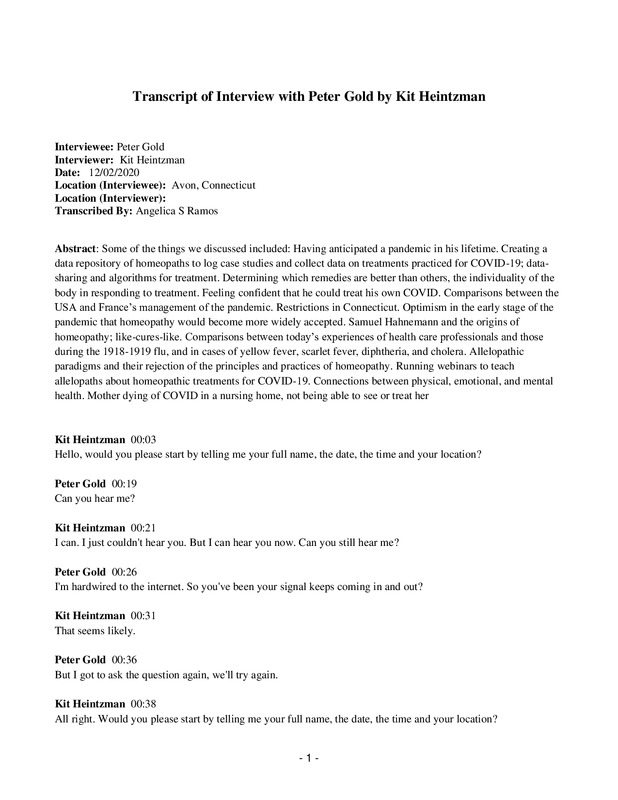
2020-12-02T14:08
Self-description:
“I am currently the senior staff person for the American Institute of Homeopathy. The American Institute of Homeopathy is the oldest medical society in the United State, predating the American Medical Association by approximately 3 years. I have served the homeopathic community in a variety of capacities over the past 15 or so years. Helping the National Center for Homeopathy, The Academy of Veterinary Homeopathy, The Canadian Academy of Homeopathy, and other organizations—particularly with respect to research, communications, and outreach. I’m a biologist by training. I have been involved with homeopathy since the late 1990s, very extensively. I’ve trained to better understand homeopathy. I actually spent 15 years training in the field. So, I understand the practice of homeopathy very well.”
Some of the things we discussed included:
Having anticipated a pandemic in his lifetime
Creating a data repository of homeopaths to log case studies and collect data on treatments practiced for COVID-19; data-sharing and algorithms for treatment
Determining which remedies are better than others, the individuality of the body in responding to treatment
Feeling confident that he could treat his own COVID
Comparisons between the USA and France’s management of the pandemic
Restrictions in Connecticut
Optimism in the early stage of the pandemic that homeopathy would become more widely accepted
Samuel Hahnemann and the origins of homeopathy; like-cures-like
Comparisons between today’s experiences of health care professionals and those during the 1918-1919 flu, and in cases of yellow fever, scarlet fever, diphtheria, and cholera
Allelopathic paradigms and their rejection of the principles and practices of homeopathy
Running webinars to teach allelopaths about homeopathic treatments for COVID-19
Connections between physical, emotional, and mental health
Mother dying of COVID in a nursing home, not being able to see or treat her
-
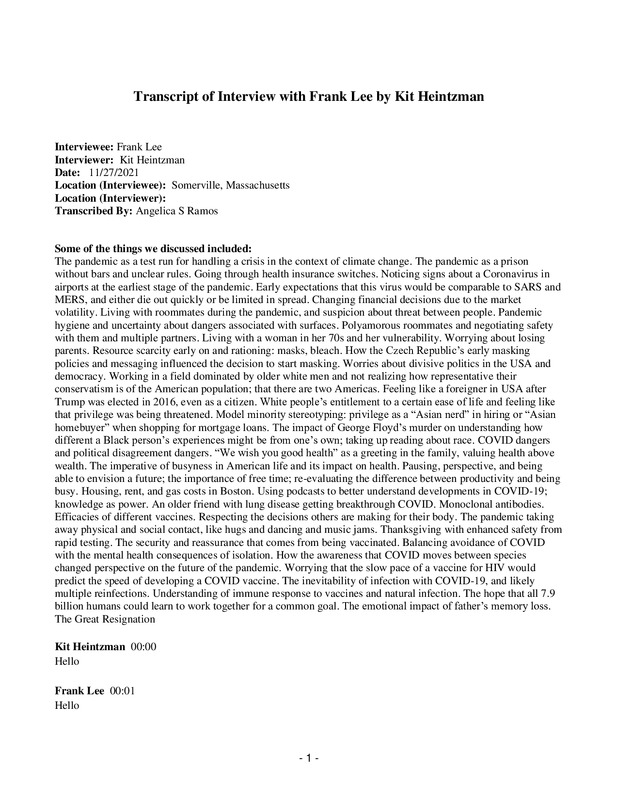
2021-11-27
Self-description:
“I consider myself a young professional even though I’m middle aged, in my 40s. I work in technology. Specifically, I’m a chip designer. I design chips that go into power supplies and battery chargers. I’m in the process of transitioning fields; learning to become a biologist. Studying biology at a DIY biomarker space, since there are such things now. It’s really awesome. My inspiration for doing that is to work on climate change mitigation, [for] which my intuition says biology will be very important. I’m fairly certain that we’re going to get the zero carbon grid, I feel that there are many smart people working on that and that we will absolutely get there, even though it will be hard, but I don’t see enough people working on getting rid of all the extra carbon dioxide we’ve put into the atmosphere since 1750, since the [Industrial Revolution, half] of which I believe we’ve put in the atmosphere since 1980, kind of scary. So that’s where I come from. Since I’ve been a professional, I’m a higher earner than the average person. That gives me a lot more time and flexibility to pursue other things.”
Some of the things we discussed included:
The pandemic as a test run for handling a crisis in the context of climate change
The pandemic as a prison without bars and unclear rules
Going through health insurance switches
Noticing signs about a Coronavirus in airports at the earliest stage of the pandemic
Early expectations that this virus would be comparable to SARS and MERS, and either die out quickly or be limited in spread
Changing financial decisions due to the market volatility
Living with roommates during the pandemic, and suspicion about threat between people
Pandemic hygiene and uncertainty about dangers associated with surfaces
Polyamorous roommates and negotiating safety with them and multiple partners
Living with a woman in her 70s and her vulnerability. Worrying about losing parents
Resource scarcity early on and rationing: masks, bleach
How the Czech Republic’s early masking policies and messaging influenced the decision to start masking
Worries about divisive politics in the USA and democracy
Working in a field dominated by older white men and not realizing how representative their conservatism is of the American population; that there are two Americas
Feeling like a foreigner in USA after Trump was elected in 2016, even as a citizen
White people’s entitlement to a certain ease of life and feeling like that privilege was being threatened
Model minority stereotyping: privilege as a “Asian nerd” in hiring or “Asian homebuyer” when shopping for mortgage loans
The impact of George Floyd’s murder on understanding how different a Black person’s experiences might be from one’s own; taking up reading about race
COVID dangers and political disagreement dangers
“We wish you good health” as a greeting in the family, valuing health above wealth
The imperative of busyness in American life and its impact on health
Pausing, perspective, and being able to envision a future; the importance of free time; re-evaluating the difference between productivity and being busy
Housing, rent, and gas costs in Boston
Using podcasts to better understand developments in COVID-19; knowledge as power
An older friend with lung disease getting breakthrough COVID
Monoclonal antibodies
Efficacies of different vaccines
Respecting the decisions others are making for their body
The pandemic taking away physical and social contact, like hugs and dancing and music jams
Thanksgiving with enhanced safety from rapid testing
The security and reassurance that comes from being vaccinated
Balancing avoidance of COVID with the mental health consequences of isolation
How the awareness that COVID moves between species changed perspective on the future of the pandemic
Worrying that the slow pace of a vaccine for HIV would predict the speed of developing a COVID vaccine
The inevitability of infection with COVID-19, and likely multiple reinfections
Understanding of immune response to vaccines and natural infection
The hope that all 7.9 billion humans could learn to work together for a common goal
The emotional impact of father’s memory loss
The Great Resignation
Other cultural references: CVS, YouTube, Czech Masking PSA (https://www.youtube.com/watch?v=2_WxtSavZR4), This Week in Virology podcast ( https://www.microbe.tv/twiv/), Zoom, Signal, Slack, Discord, contra dancing, Frank Ostaseski’s book The Five Invitations (2017)
See also: My online laboratory notebooks at https://notebooks.ElectrifiedResearch.com/home/franklee and https://notebooks.ElectrifiedResearch.com/boslab
-
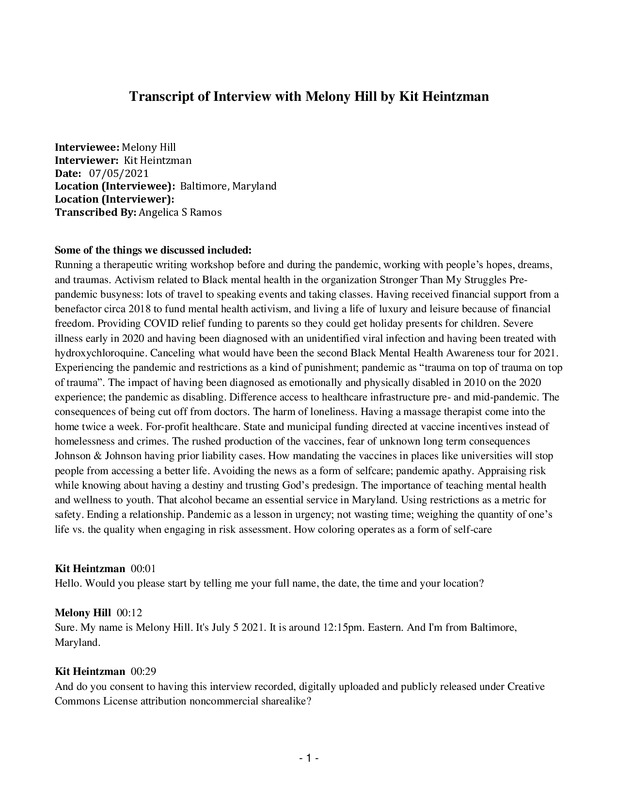
2021-07-05
Self-description: “Hi there, I’m Melony Hill. I’m a life-transition coach and trauma survivor from Baltimore, Maryland. I’m really focused on mental health and the pandemic really really stretched my ability to deal with the way that I had been dealing with my mental health.”
-
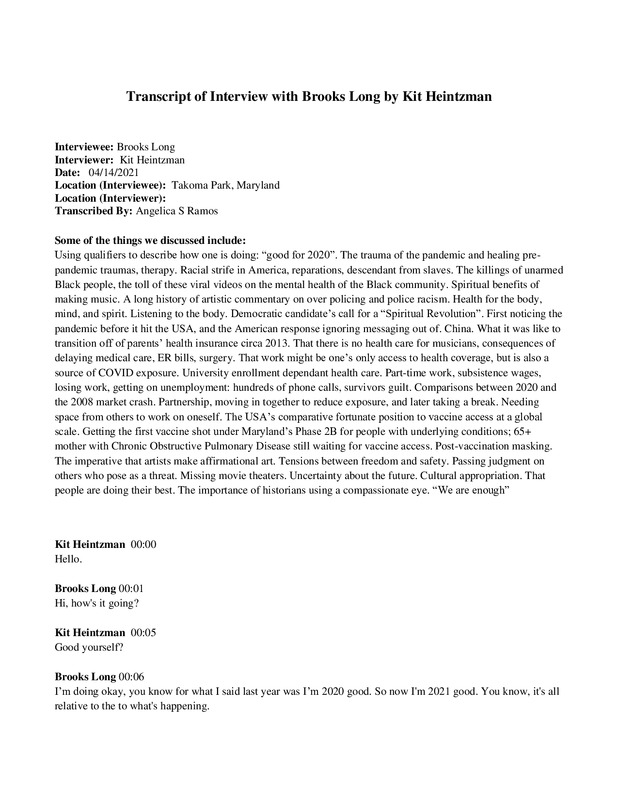
2021-04-14
Some of the things we discussed included:
Using qualifiers to describe how one is doing: “good for 2020”
The trauma of the pandemic and healing pre-pandemic traumas, therapy
Racial strife in America, reparations, descendant from slaves
The killings of unarmed Black people, the toll of these viral videos on the mental health of the Black community
Spiritual benefits of making music
A long history of artistic commentary on over policing and police racism
Health for the body, mind, and spirit
Listening to the body
Democratic candidate’s call for a “Spiritual Revolution”
First noticing the pandemic before it hit the USA, and the American response ignoring messaging out of China
What it was like to transition off of parents’ health insurance circa 2013
That there is no health care for musicians, consequences of delaying medical care, ER bills, surgery
That work might be one’s only access to health coverage, but is also a source of COVID exposure
University enrollment dependant health care
Part-time work, subsistence wages, losing work, getting on unemployment: hundreds of phone calls, survivors guilt
Comparisons between 2020 and the 2008 market crash
Partnership, moving in together to reduce exposure, and later taking a break
Needing space from others to work on oneself
The USA’s comparative fortunate position to vaccine access at a global scale
Getting the first vaccine shot under Maryland’s Phase 2B for people with underlying conditions; 65+ mother with Chronic Obstructive Pulmonary Disease still waiting for vaccine access
Post-vaccination masking
The imperative that artists make affirmational art
Tensions between freedom and safety
Passing judgment on others who pose as a threat
Missing movie theaters
Uncertainty about the future
Cultural appropriation
That people are doing their best
The importance of historians using a compassionate eye
“We are enough”
Other cultural references:
Creative Alliance, Disney, NLF, MLB, Zoom, Scam Calls, Louis Jordan’s “Saturday Night Fish Fry”, Marvin Gay, Ma Rainey, The Music Box Radio, Domino’s Pizza, Twitter, 9/11, Nina Simone, James Baldwin documentary I’m Not Your Negro (2016), Transcendental Meditation Practice, Tara Brach’s book Radical Acceptance (2003), Marshall Rosenberg’s book Nonviolent Communication (1999).
-
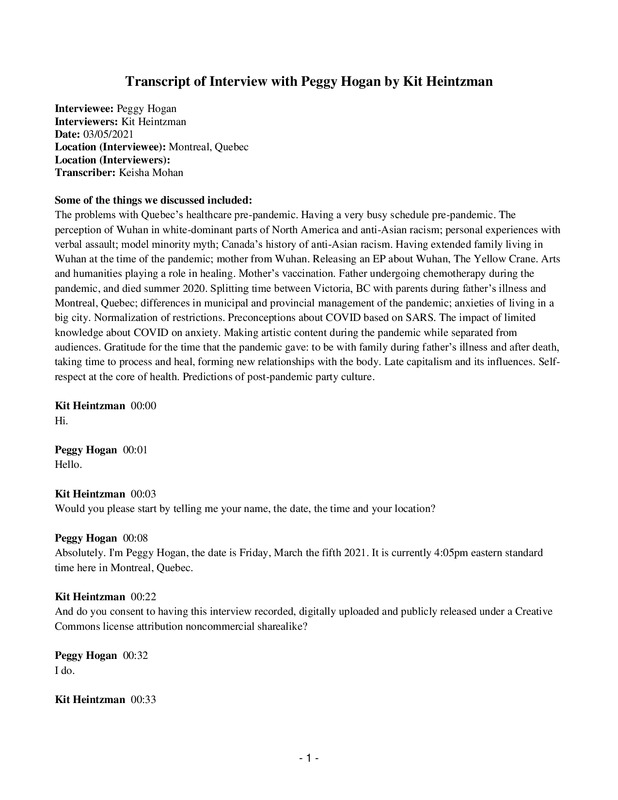
2021-03-05T16:05
Self-introduction:
“My name’s Peggy Hogan. I’m a Chinese-Canadian recording artist that goes by Hua Li. And I’m also a music educator and researcher, and I am the current symposium director for Pop Montreal International Music Festival.”
-
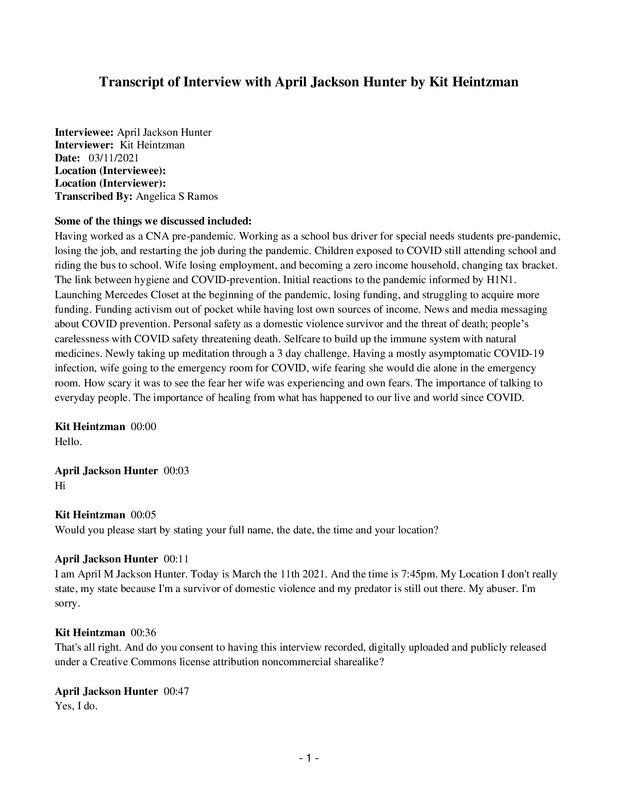
2021-03-11
Self-description:
“My name is April-Jackson Hunter. I’m an award winning author and the founder and president of Mercedes Closet Inc., which is a non-profit geared to empowering survivors in the LGBTQ community of violence. And I’m a survivor of COVID-19.”
Some of the things we talked about included:
Having worked as a CNA pre-pandemic
Working as a school bus driver for special needs students pre-pandemic, losing the job, and restarting the job during the pandemic
Children exposed to COVID still attending school and riding the bus to school
Wife losing employment, and becoming a zero income household, changing tax bracket
The link between hygiene and COVID-prevention
Initial reactions to the pandemic informed by H1N1
Launching Mercedes Closet at the beginning of the pandemic, losing funding, and struggling to acquire more funding
Funding activism out of pocket while having lost own sources of income
News and media messaging about COVID prevention
Personal safety as a domestic violence survivor and the threat of death; people’s carelessness with COVID safety threatening death
Selfcare to build up the immune system with natural medicines
Newly taking up meditation through a 3 day challenge
Having a mostly asymptomatic COVID-19 infection, wife going to the emergency room for COVID, wife fearing she would die alone in the emergency room
How scary it was to see the fear her wife was experiencing and own fears
The importance of talking to everyday people
The importance of healing from what has happened to our live and world since COVID
-
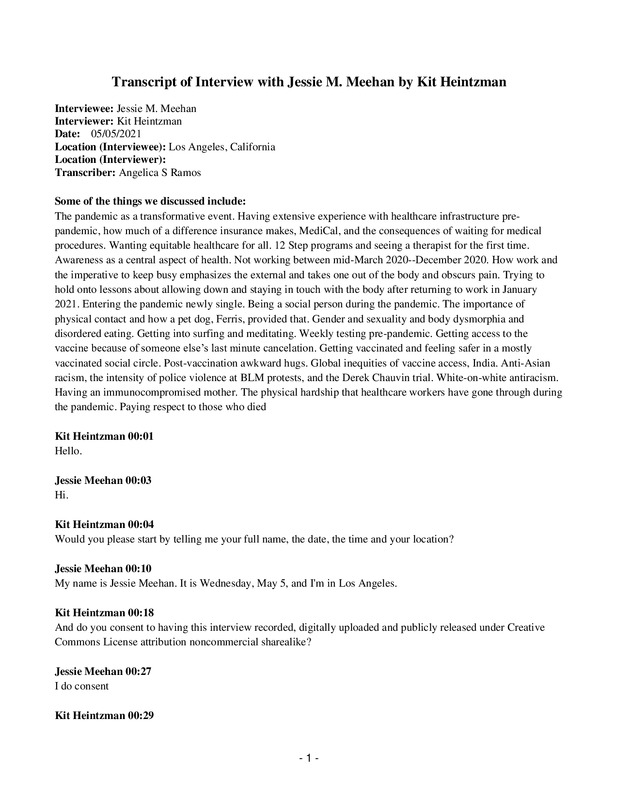
2021-05-05
Self-description:
“I’m a queer female. And, I’m in a band called WASI and, you know, we’ve been playing together for quite some time. And It’s a lot of fun, electronic, kind of punky. I also work in television as a set dresser. That’s pretty much what I’m up to. I’m a big advocate for queer visibility, out in life, in work, everywhere. And having safe spaces, my band is very much about safe spaces.”
-
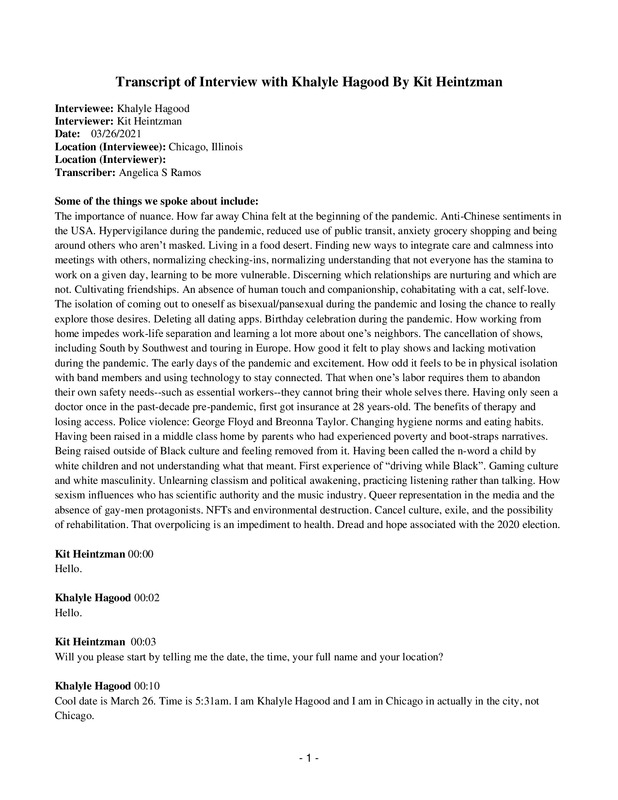
2021-03-26
Self description:
“I’m 30. I’ve been in Chicago since winter 2013, so I’m not a native. I’m from down state. I work a fulltime job. I’m in 5 bands. I live by myself. I live in... probably one of the less desirable neighbours, the neighbourhoods my grandma would probably be upset about, even though I love living here. I make money above the poverty line.” Performs in the following bands: Bussy Kween Power Trip, Gilt Drip, Cordoba, The Devonns, DXTR SPITS.
-
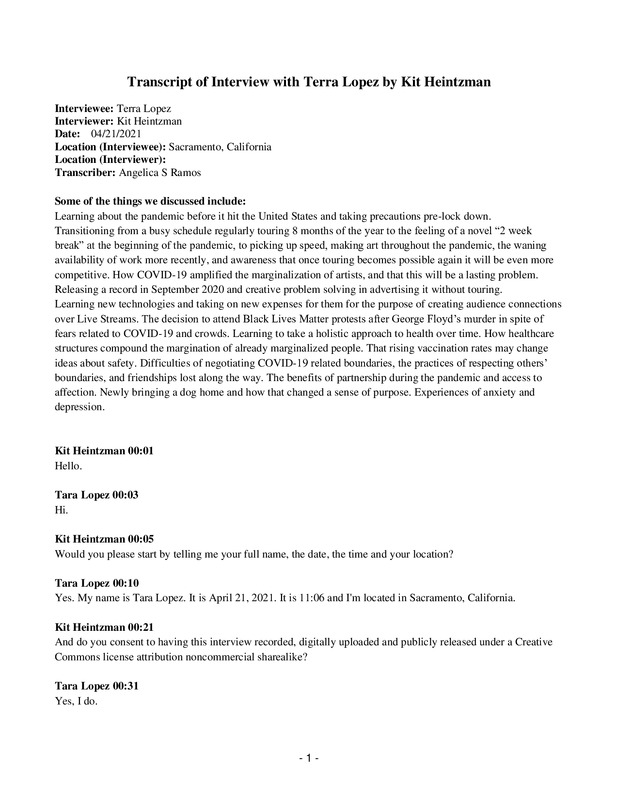
2021-04-21
Lopez’s self-description: “I am a full-time musician, a touring artist, a recording artist, along with being a music publicist.”
-
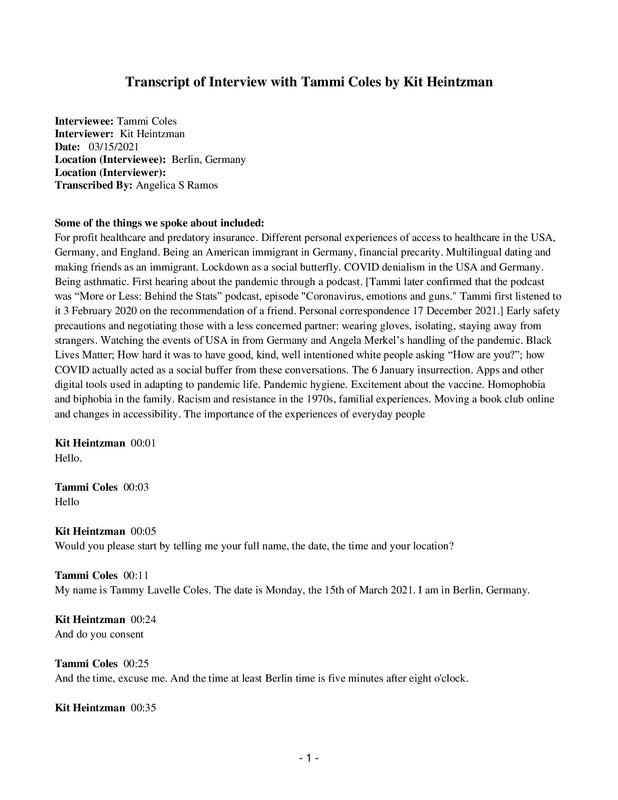
2021-03-15
Self-description: “My name is Tammi. I am a US citizen, and I have been living in Berlin, Germany since 2006. I am an immigrant and that definitely shapes my experience these days. I arrived when I was in my late-30s…, now I’m in my 50s. I’m African American. I am bisexual queer. I am polyamorous. Twice married. Twice divorced. Living with my cis white German partner, straight boy, who I met here in Germany. I guess now it’s been about 4 or 5 years. I’m living here with him, I think that will also inform some of the things I have to say about my experience under COVID.”
Some of the things we spoke about included:
For profit healthcare and predatory insurance
Different personal experiences of access to healthcare in the USA, Germany, and England
Being an American immigrant in Germany, financial precarity
Multilingual dating and making friends as an immigrant
Lockdown as a social butterfly
COVID denialism in the USA and Germany
Being asthmatic
First hearing about the pandemic through a podcast. [Tammi later confirmed that the podcast was “More or Less: Behind the Stats” podcast, episode "Coronavirus, emotions and guns." Tammi first listened to it 3 February 2020 on the recommendation of a friend. Personal correspondence 17 December 2021.]
Early safety precautions and negotiating those with a less concerned partner: wearing gloves, isolating, staying away from strangers
Watching the events of USA in from Germany and Angela Merkel’s handling of the pandemic
Black Lives Matter; How hard it was to have good, kind, well intentioned white people asking “How are you?”; how COVID actually acted as a social buffer from these conversations
The 6 January insurrection
Apps and other digital tools used in adapting to pandemic life
Pandemic hygiene
Excitement about the vaccine
Homophobia and biphobia in the family
Racism and resistance in the 1970s, familial experiences
Moving a book club online and changes in accessibility
The importance of the experiences of everyday people
Other cultural references: Aunt Jemima Pancake Syrup, Washington Redskins, Zoom, George Floyd, Netflix, Habitica, FocusMate, Tamagotchi, Body Doubling Technique, Gettysburg, More or Less: Behind the Stats podcast
-
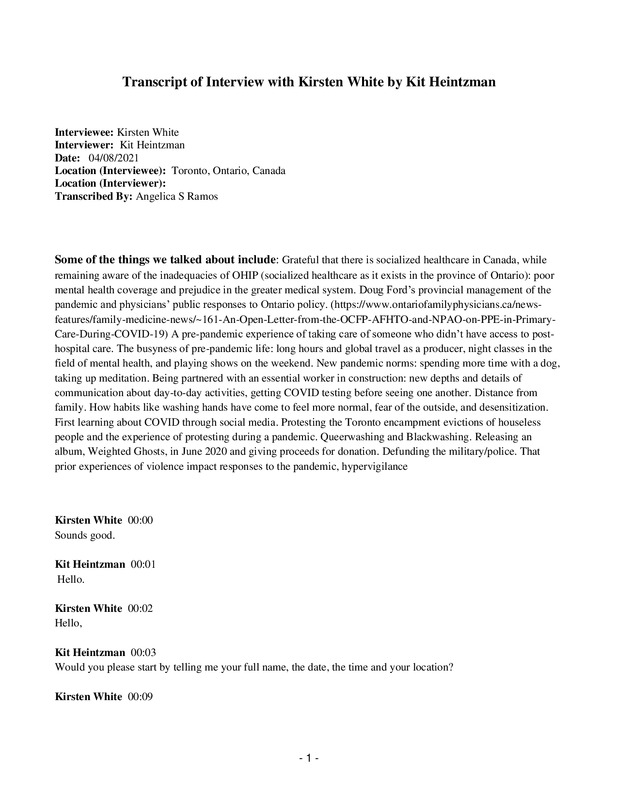
2021-04-08
Self-description: “I’m a pansexual, white, female, colonizing Toronto. I’m a commercial producer and a psychotherapist in training. I also play hardcore and metal music, and front two bands in that genre. I’m a staunch feminist and a supporter of antifa, and love all living breathing things.”
-
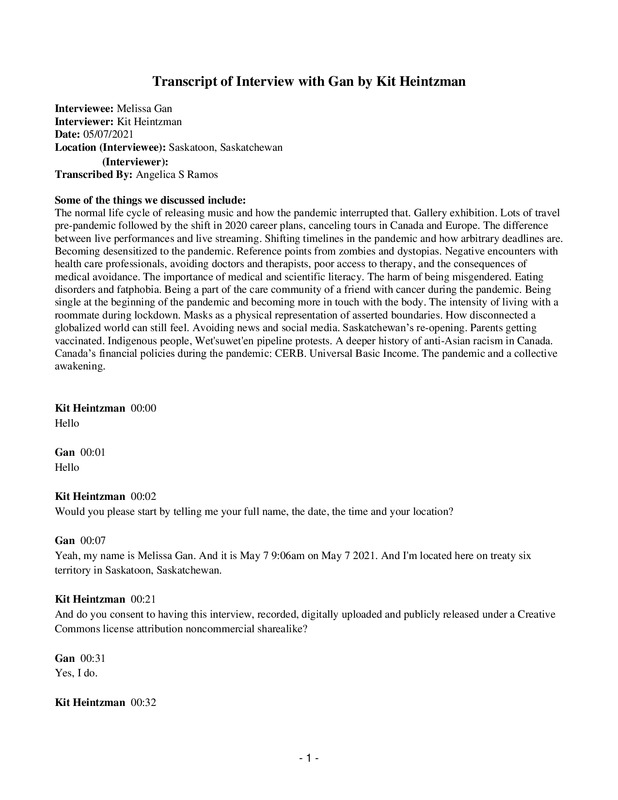
2021-05-07
Self Description - “I go by gan. I identify as agender, or just like don’t identify with any gender. I am 30-years-old. I am Chinese-Malaysian. My parents are immigrants from Malaysia, so I’m first or second generation, however people classify that. I’m a settler on indigenous land. And I have somehow become a full time musician/artist and it’s a very permeable kind of space, but I’ve moved between doing musical performance, composition, some sorts of writing or like installation kinds of things; it’s just a very open space to explore. My upbringing was in a mostly middle class kind of family. My dad is a civil engineer, I would say in my childhood we were much more strapped for money than we are now, and a big part of that is because of his education. And, my mom is a homemaker. I have one older brother as well, who works in chemistry and lab technology.”
-
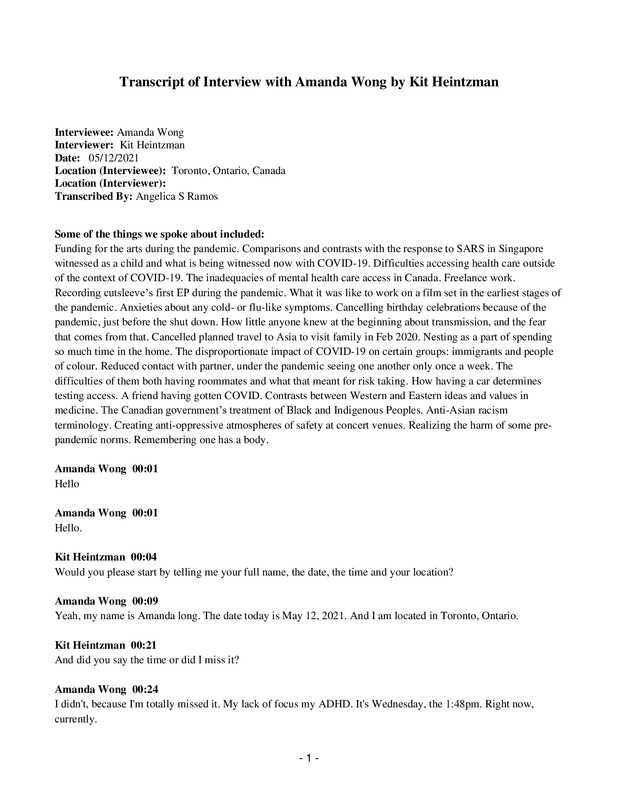
2021-05-12
Self Description: “My name is Amanda Wong. I am a member of the band cutsleeve. We are an all queer, East Asian, alt-rock band, based here in Toronto. On the side I am also a filmmaker and a sound artist. I am an immigrant here to Canada; I moved here when I was 12.”
 2022-06-27
2022-06-27 2022-06-15
2022-06-15 2021-04-15
2021-04-15 2021-02-25T12:12
2021-02-25T12:12 2022-03-11
2022-03-11 2020-06-13
2020-06-13 2022-05-30
2022-05-30 2022-05-26
2022-05-26 2022-06-10
2022-06-10 2022-06-08
2022-06-08 2022-02-22T09
2022-02-22T09 2022-05-24
2022-05-24 2022-05-10
2022-05-10 2022-05-18
2022-05-18 2022-05-23
2022-05-23 2022-05-27
2022-05-27 2022-05-19
2022-05-19 2022-03-14
2022-03-14 2022-05-02
2022-05-02 2022-03-09T13:43
2022-03-09T13:43 2021-02-22
2021-02-22 2022-03-17T10:05
2022-03-17T10:05 2022-03-01
2022-03-01 2022-03-03
2022-03-03 2022-02-14
2022-02-14 2022-02-28
2022-02-28 2021-04-12
2021-04-12 2022-02-16
2022-02-16 2021-06-25
2021-06-25 2022-02-11
2022-02-11 2022-01-27
2022-01-27 2022-02-03
2022-02-03 2022-01-08
2022-01-08 2021-01-13T13:15
2021-01-13T13:15 2022-01-26
2022-01-26 2022-01-19
2022-01-19 2021-11-28
2021-11-28 2020-12-02T14:08
2020-12-02T14:08 2021-11-27
2021-11-27 2021-07-05
2021-07-05 2021-04-14
2021-04-14 2021-03-05T16:05
2021-03-05T16:05 2021-03-11
2021-03-11 2021-05-05
2021-05-05 2021-03-26
2021-03-26 2021-04-21
2021-04-21 2021-03-15
2021-03-15 2021-04-08
2021-04-08 2021-05-07
2021-05-07 2021-05-12
2021-05-12